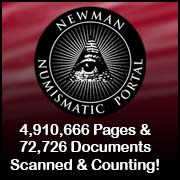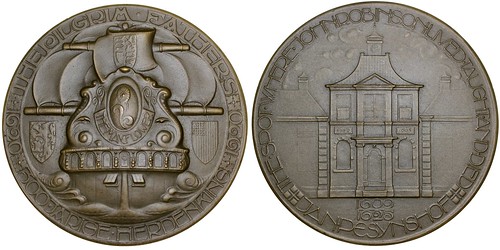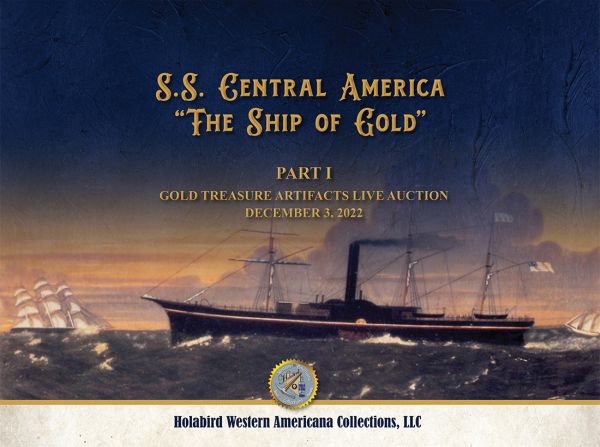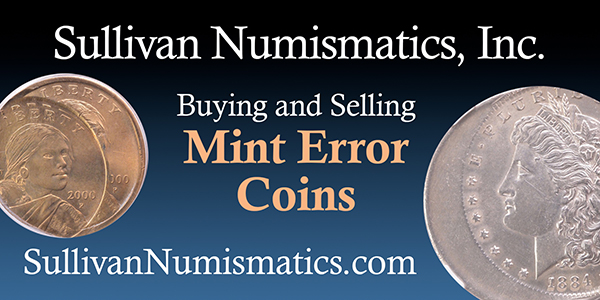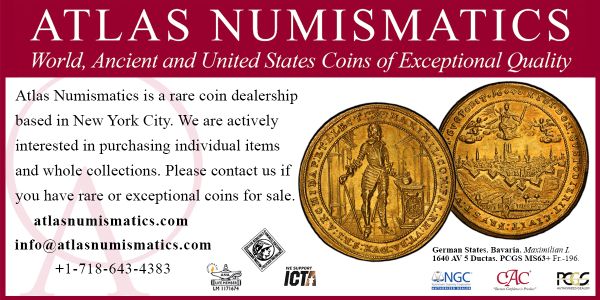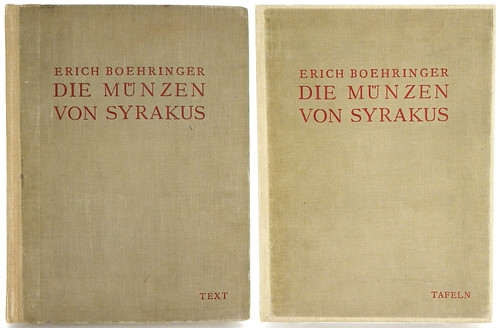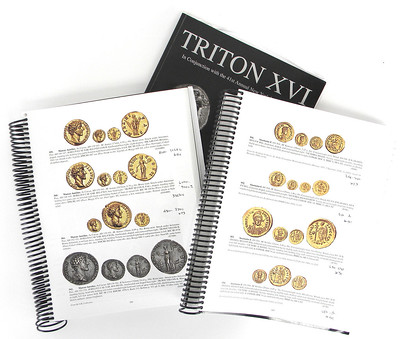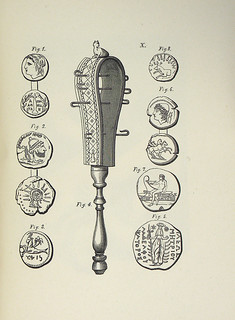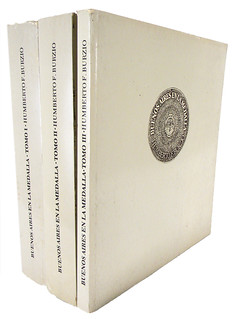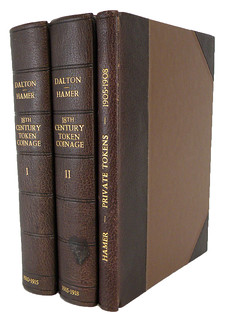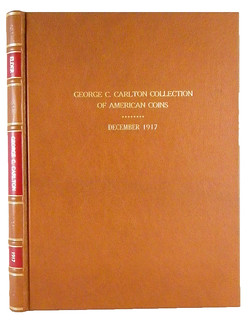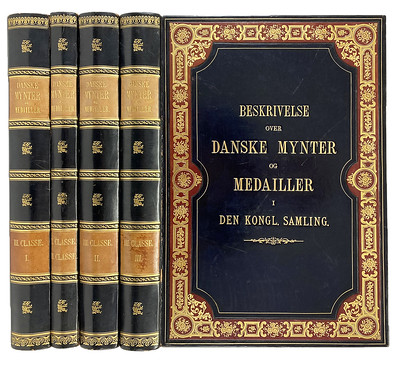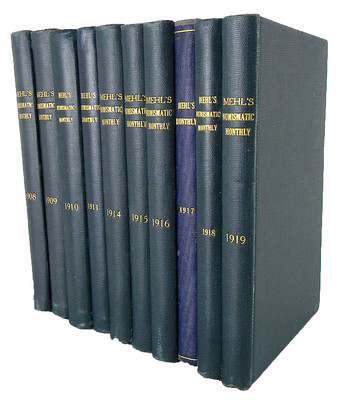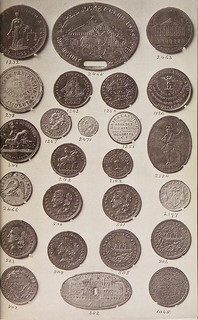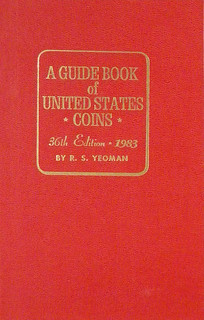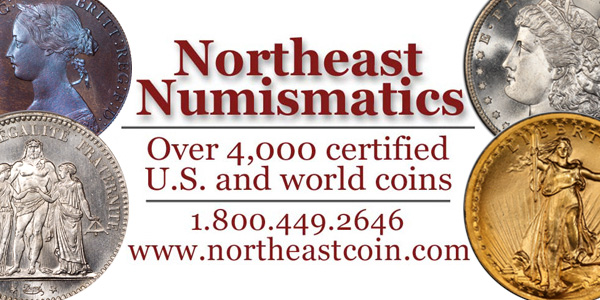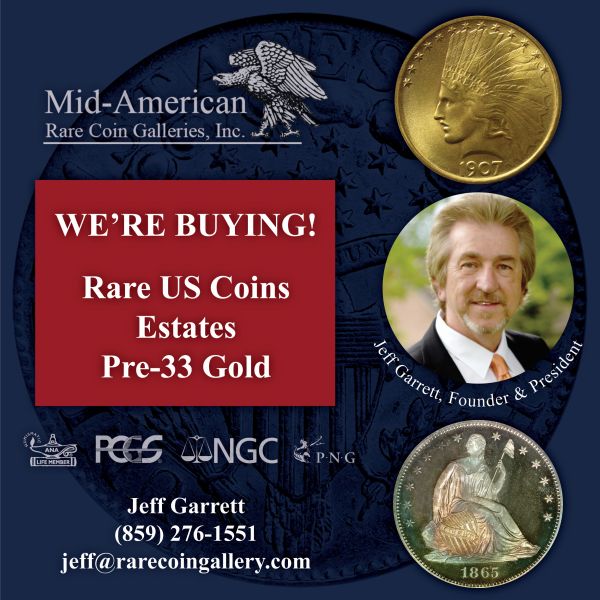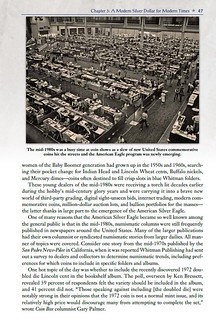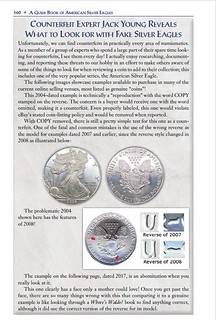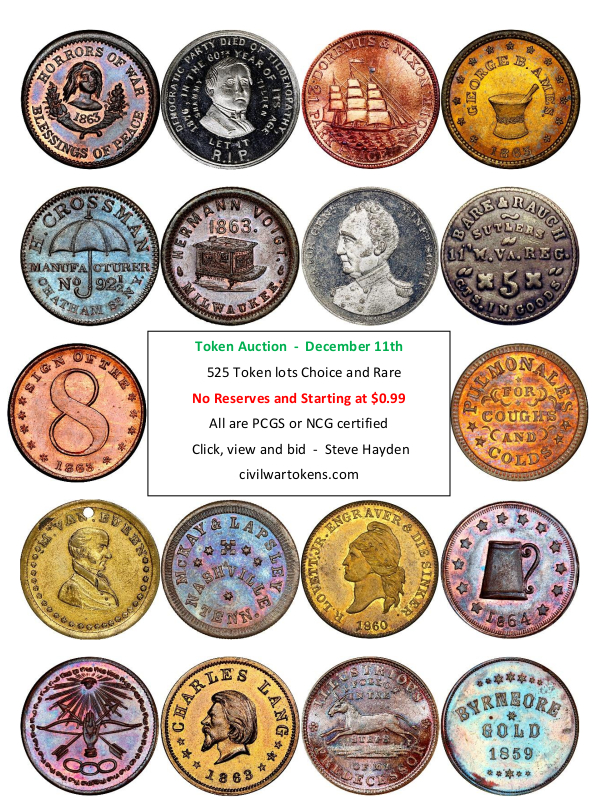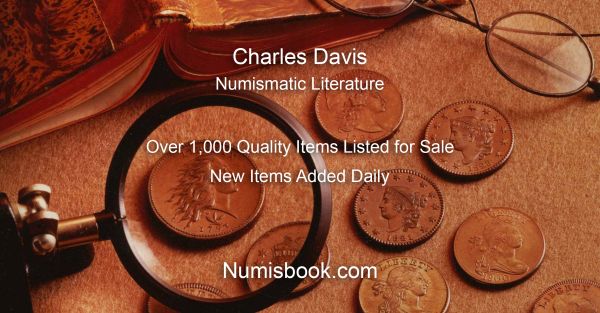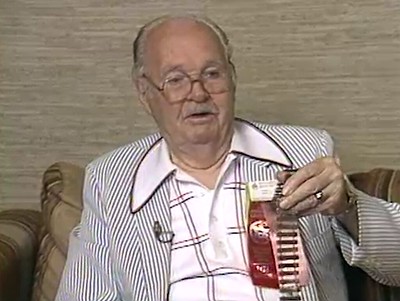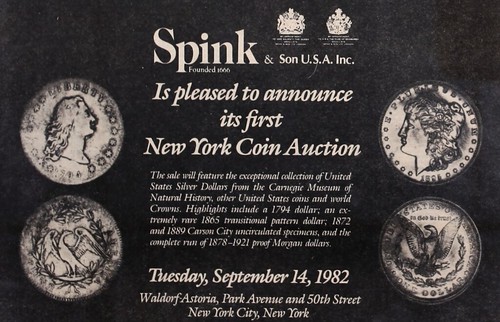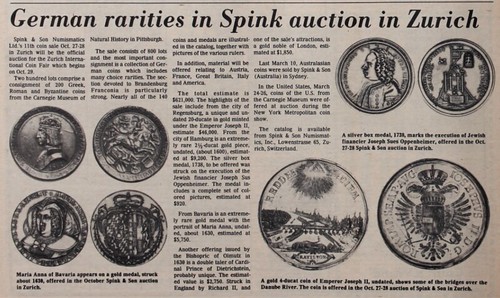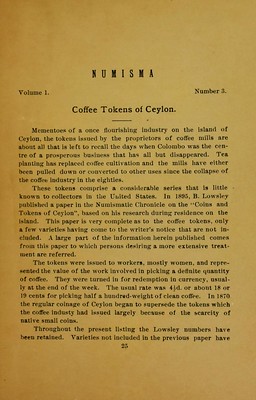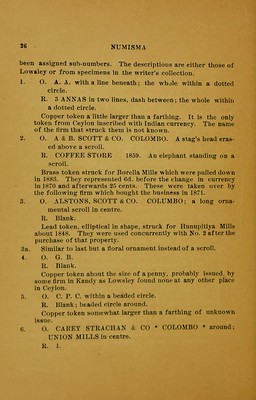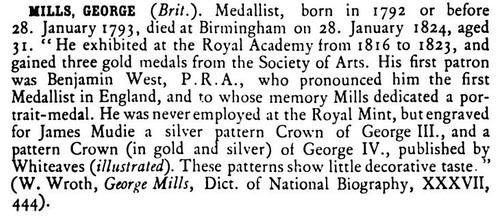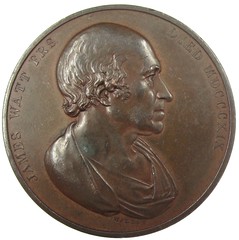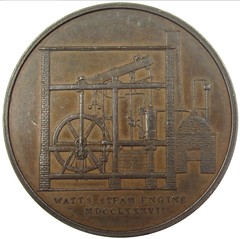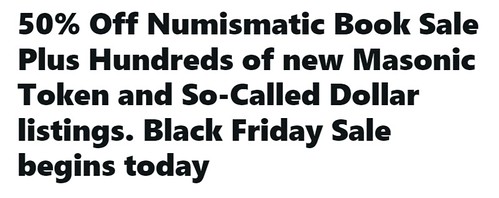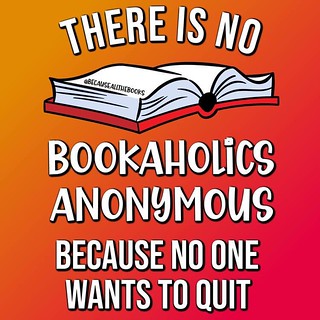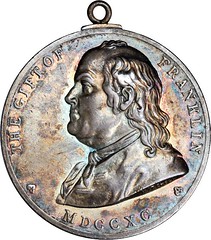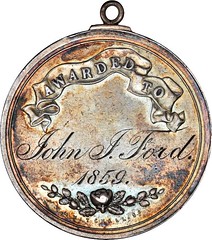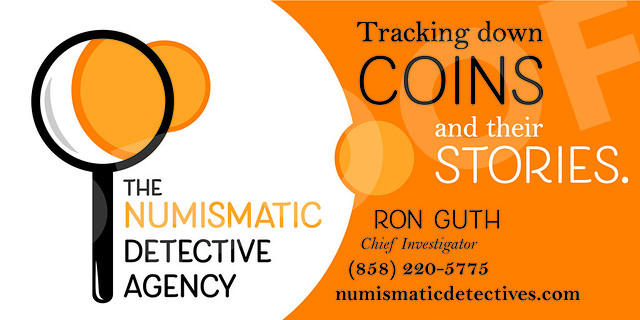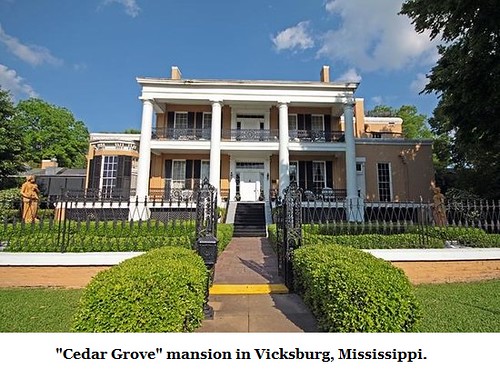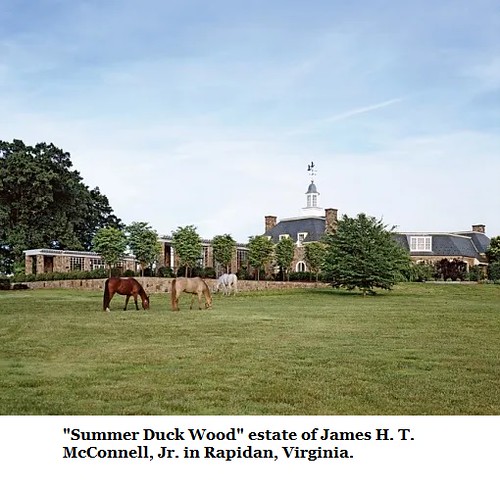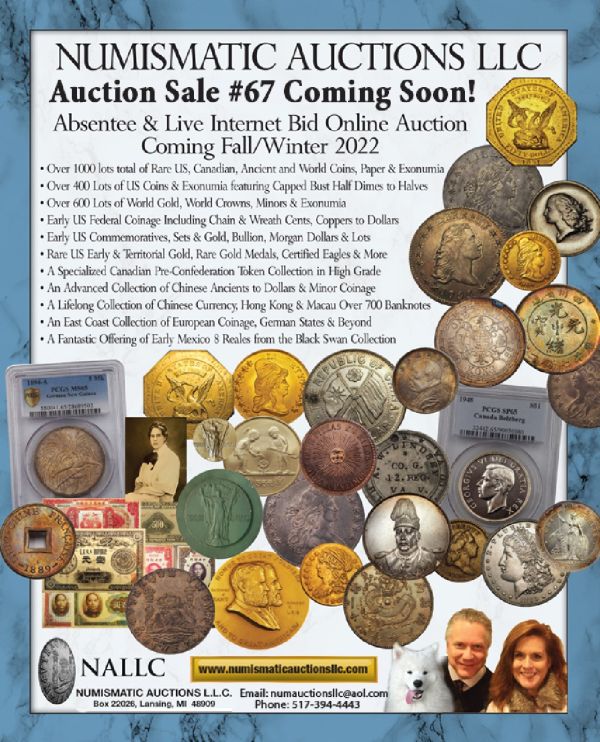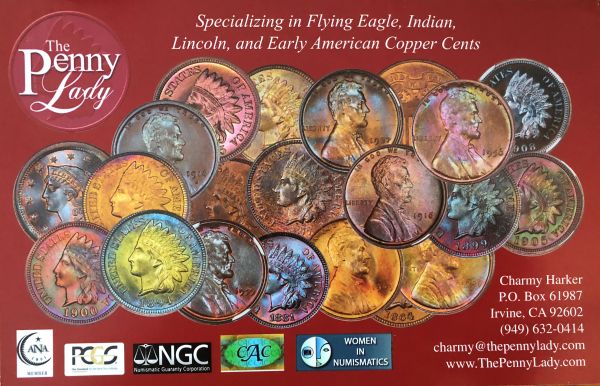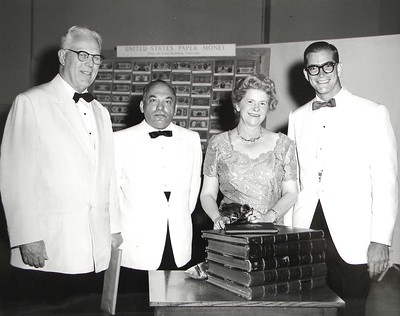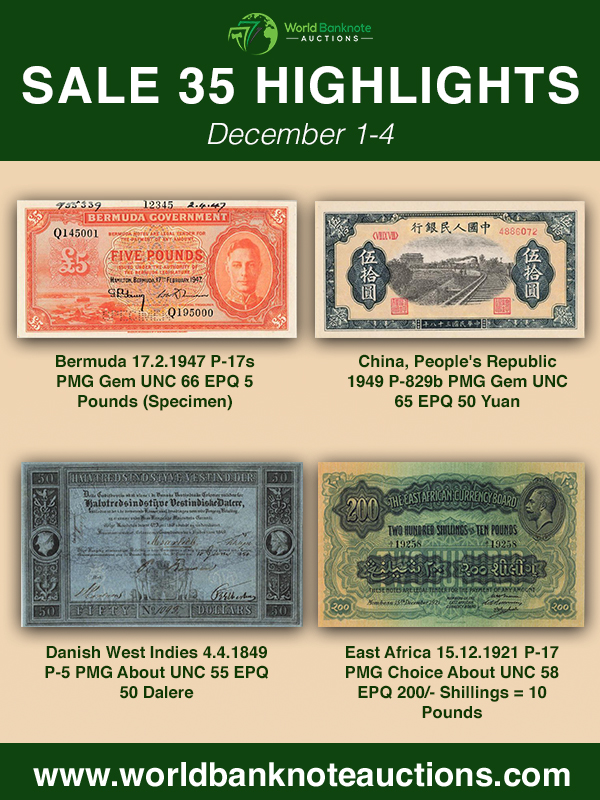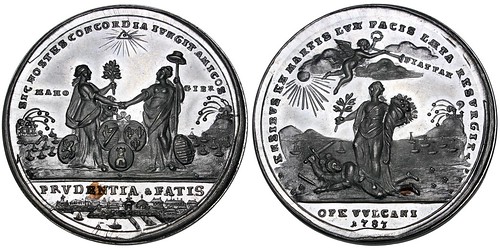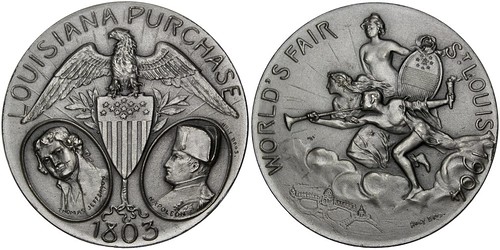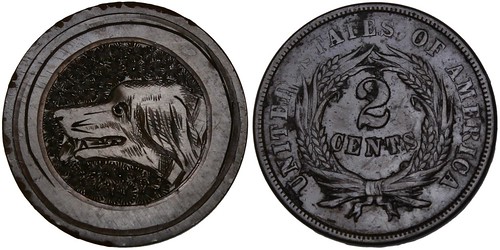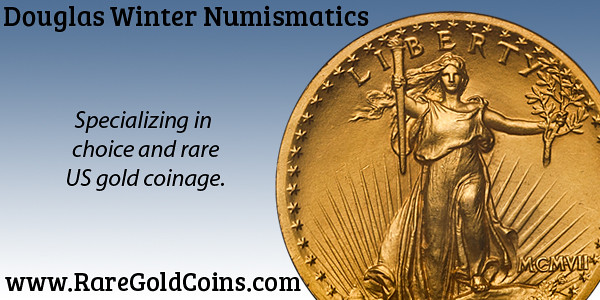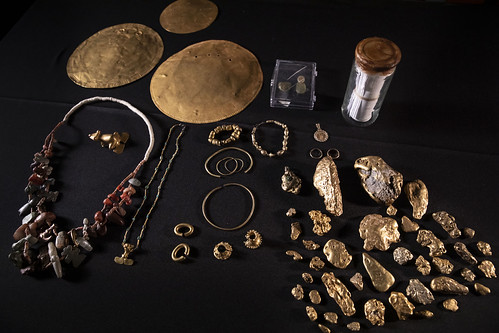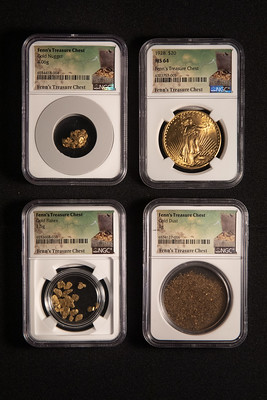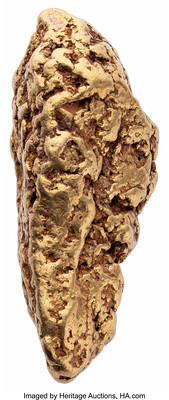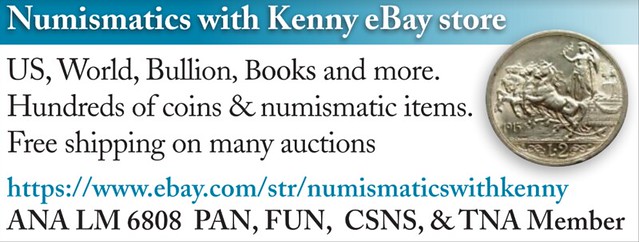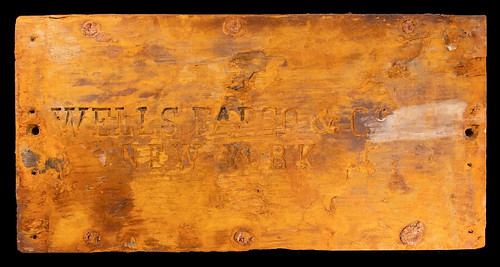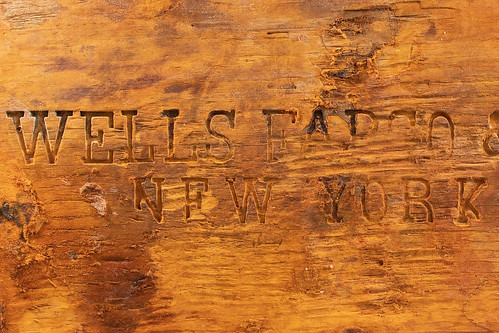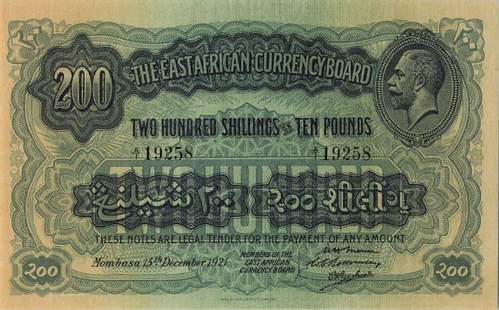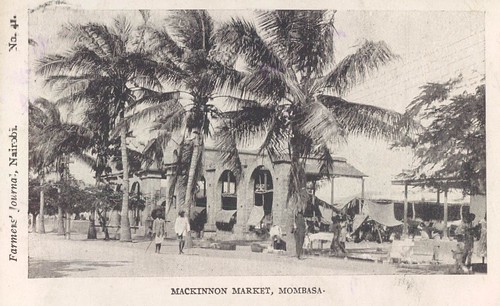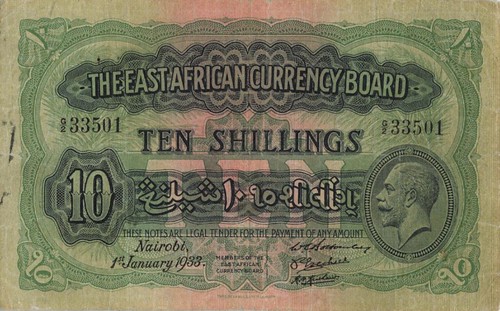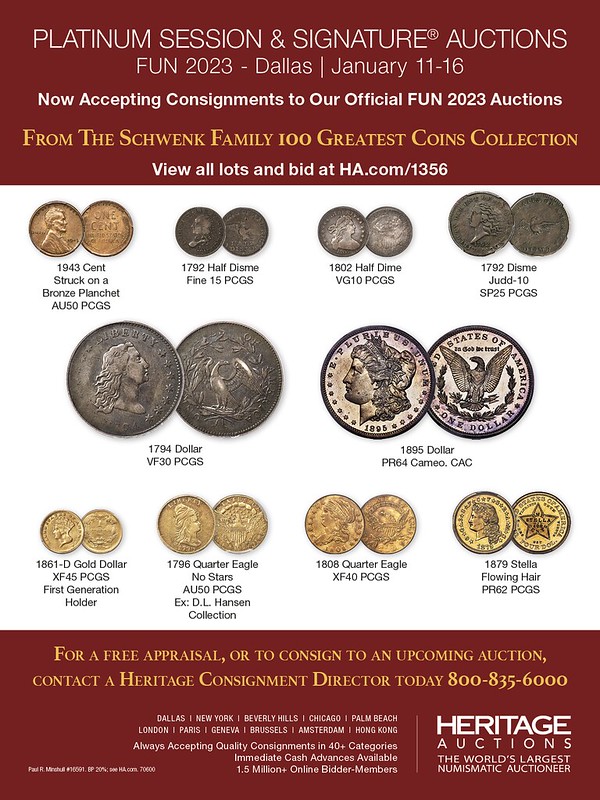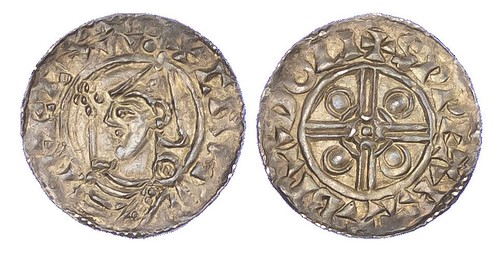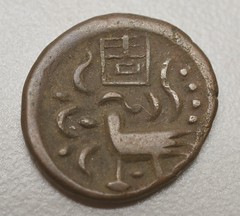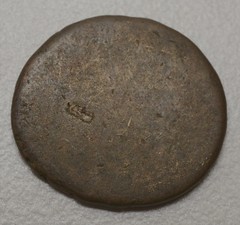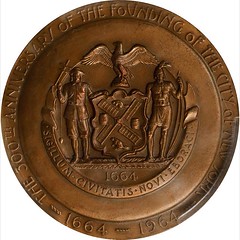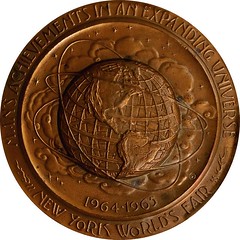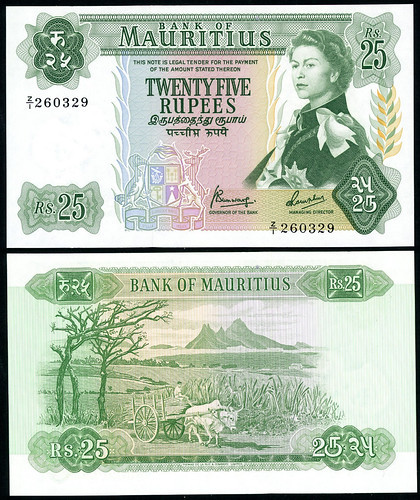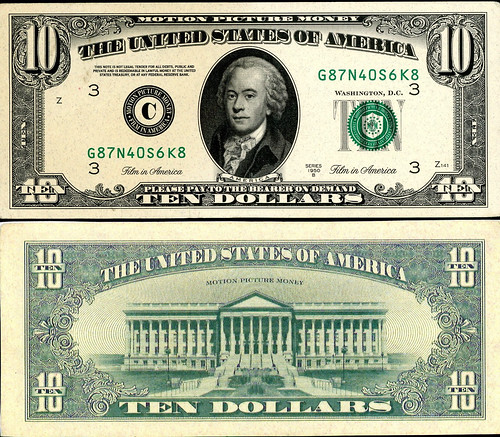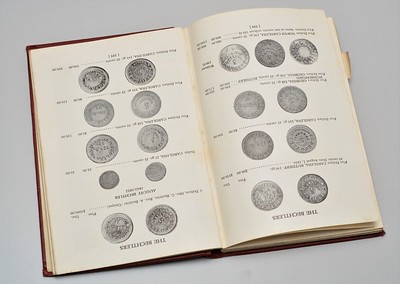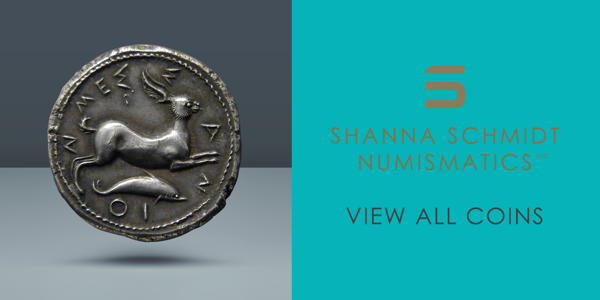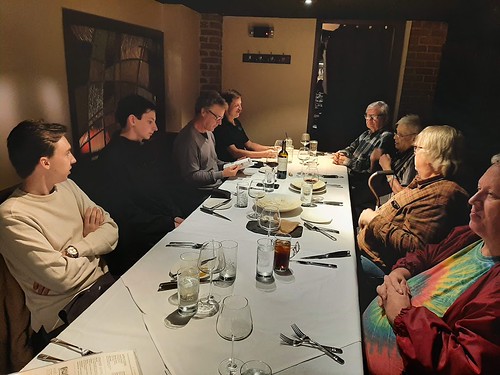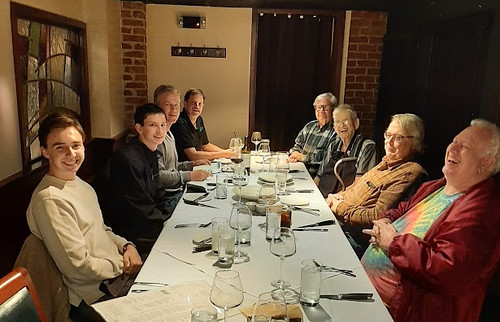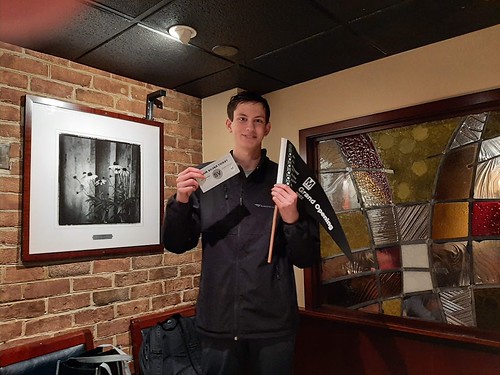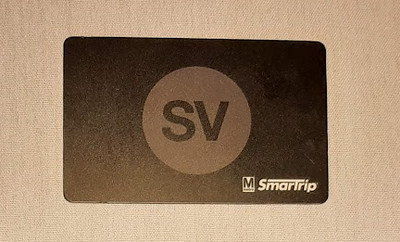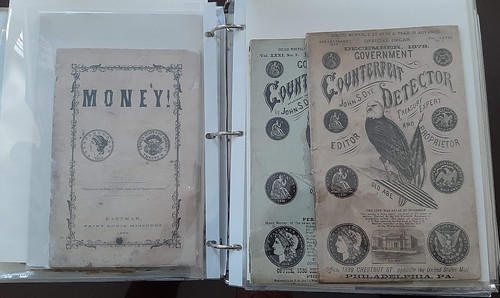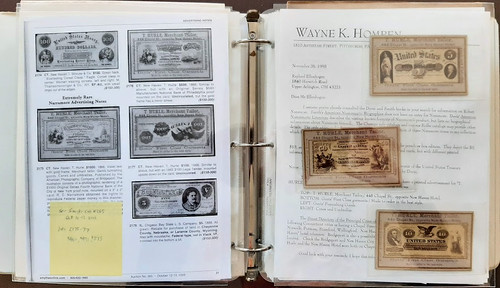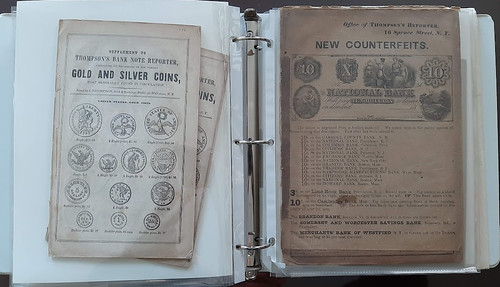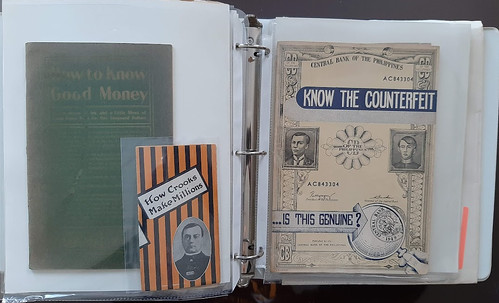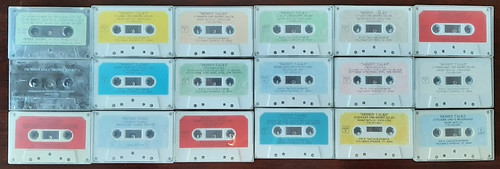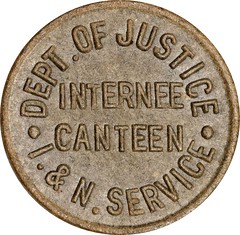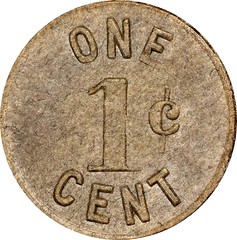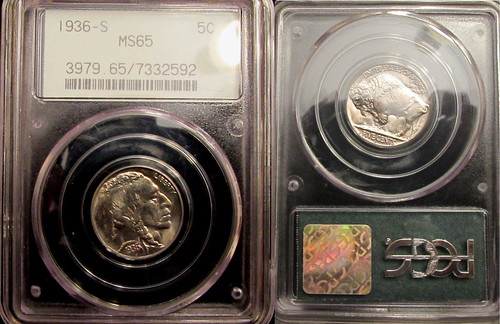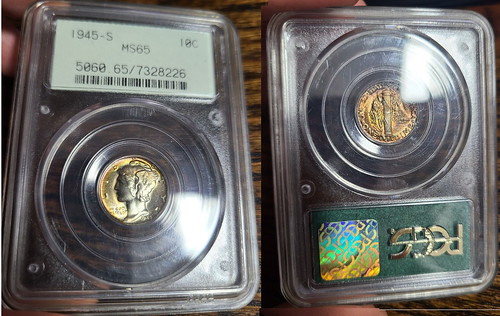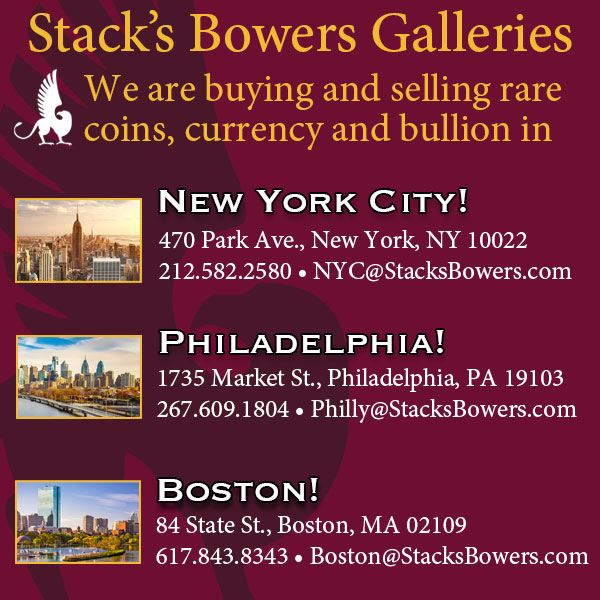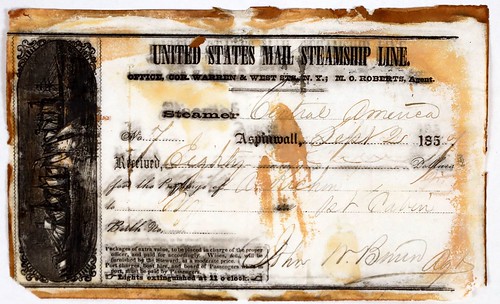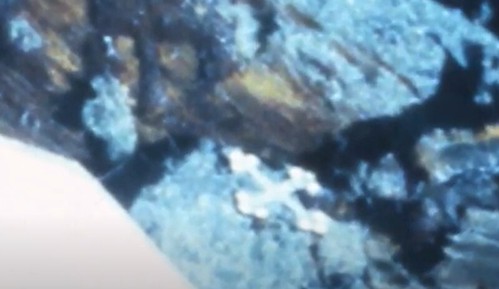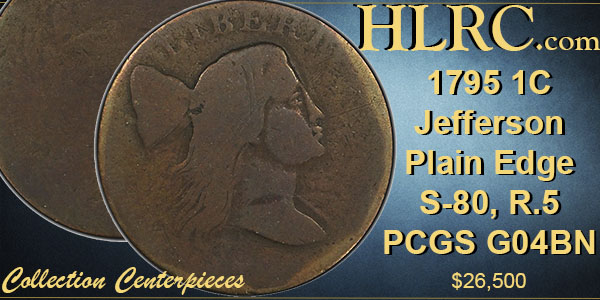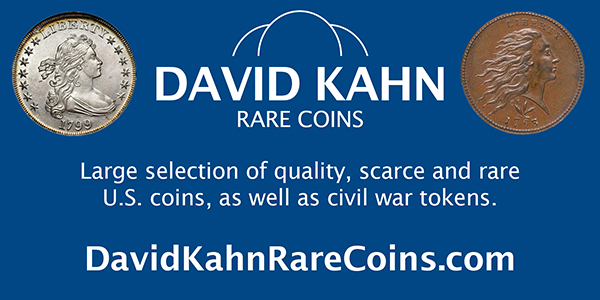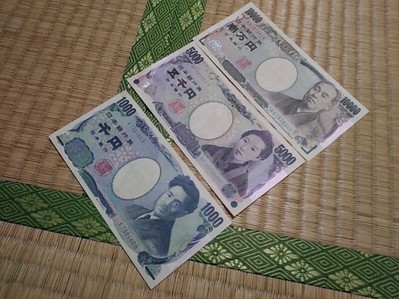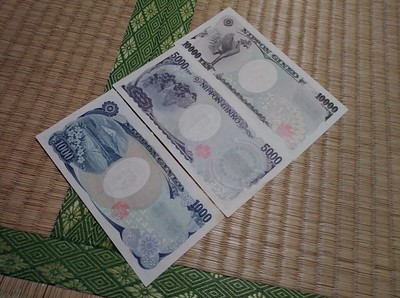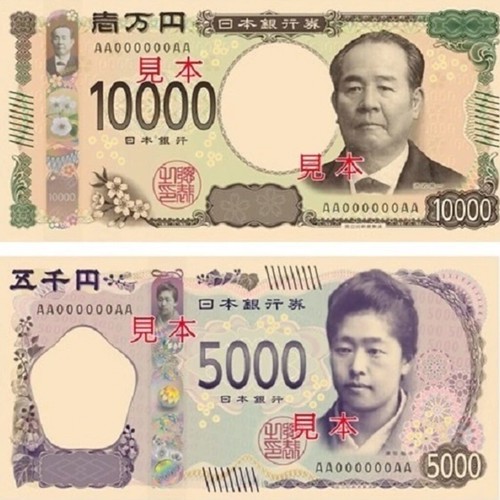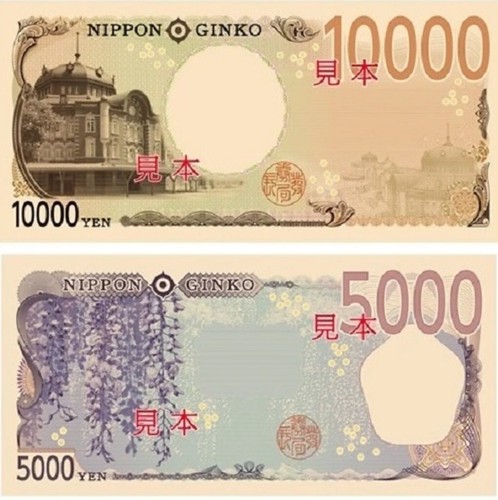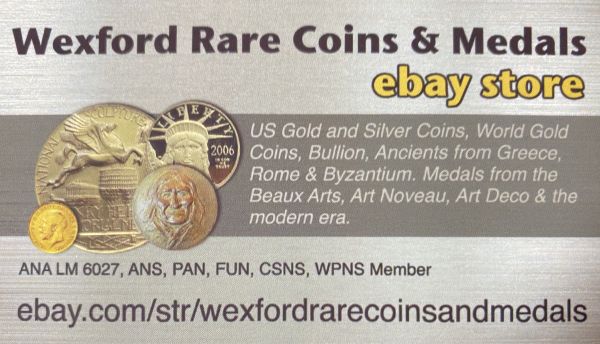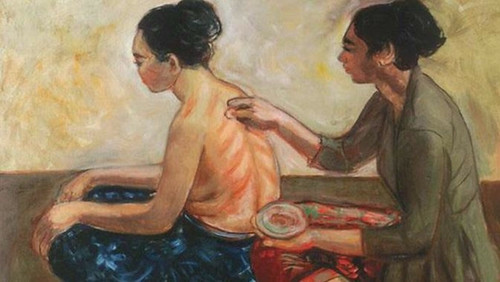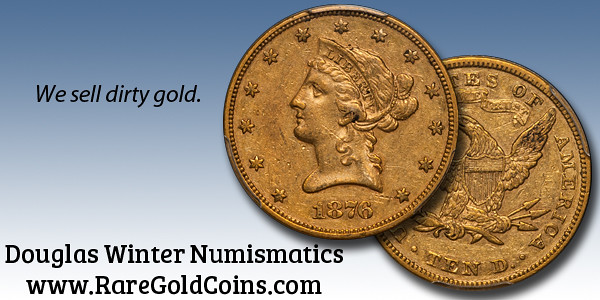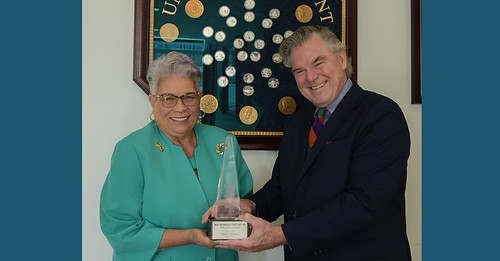
Visit our NBS Sponsors



About UsThe Numismatic Bibliomania Society is a non-profit association devoted to the study and enjoyment of numismatic literature. For more information please see our web site at coinbooks.org SubscriptionsThose wishing to become new E-Sylum subscribers (or wishing to Unsubscribe) can go to the following web page link MembershipThere is a membership application available on the web site Membership Application To join, print the application and return it with your check to the address printed on the application. Print/Digital membership is $40 to addresses in the U.S., and $60 elsewhere. A digital-only membership is available for $25. For those without web access, write to: Charles Heck, Treasurer AsylumFor Asylum mailing address changes and other membership questions, contact Chuck at this email address: treasurer@coinbooks.org SubmissionsTo submit items for publication in The E-Sylum, write to the Editor at this address: whomren@gmail.com BUY THE BOOK BEFORE THE COINSale Calendar |
- WAYNE'S WORDS: THE E-SYLUM NOVEMBER 20, 2022
- NEW E-SYLUM SUBSCRIBER CONTEST!
- ASYLUM WINTER 2022 ISSUE PUBLISHED
- KOLBE & FANNING AUCTION SALE 165 HIGHLIGHTS
- NEW BOOK: COINS OF CANADA 41ST EDITION
- NEW BOOK: REPUBLIC COINS OF INDIA VOL. 1
- NEW BOOK: CHITRESVARA-SIVA TYPE COINS
- DENNIS TUCKER: AMERICAN SILVER EAGLES
- NNP SYMPOSIUM 5 CONCLUDES
- VIDEO: AUBREY BEBEE
- THE CARNEGIE MUSEUM COIN SALES
- NOTES FROM E-SYLUM READERS: NOVEMBER 20, 2022
- VOCABULARY TERM: MEDAL AWARD PROGRAM
- UNPUBLICIZED MYSTERY COLLECTIONS
- STACK'S BOWERS OFFERS PICKENS COLLECTION
- DELUXE GEORGII MIKHAILOVICH ALBUM
- NUMISMAGRAM SELECTIONS: NOVEMBER 20, 2022
- FORREST FENN'S TREASURE CHEST OFFERED
- HOLABIRD WELLS, FARGO TREASURE CHEST
- WBNA OFFERS EAST AFRICAN RARITIES
- NUMISMATIC NUGGETS: NOVEMBER 20, 2022
- WAYNE'S NUMISMATIC DIARY: NOVEMBER 20, 2022
- BEN FRANKLIN'S FUGIO CENT
- SS CENTRAL AMERICA KNIGHT'S CROSS MEDAL
- THE RAREST VICTORIA CROSS
- JAPAN PREPARES FOR NEW BANKNOTES
- COINS IN MEDICINE
- LOOSE CHANGE: NOVEMBER 20, 2022
- NEW LIBRARY: BOOKS YES, BUT MORE
Click here to read the thin version on the web
Click here to subscribe
Click here to access the complete archive
To comment or submit articles, reply to whomren@gmail.com
Content presented in The E-Sylum is not necessarily researched or independently fact-checked, and views expressed do not necessarily represent those of the Numismatic Bibliomania Society.
WAYNE'S WORDS: THE E-SYLUM NOVEMBER 20, 2022
 New subscribers this week include:
Ian Jull of CoinCraft, courtesy of Richard Lobel;
Josep Yañez Debasa from Barcelona, Catalonia;
Kyle Knapp,
Bill OBrien, and
Zach Filis.
Welcome aboard!
New subscribers this week include:
Ian Jull of CoinCraft, courtesy of Richard Lobel;
Josep Yañez Debasa from Barcelona, Catalonia;
Kyle Knapp,
Bill OBrien, and
Zach Filis.
Welcome aboard!
Welcome to our newest advertisers! Charmy Harker ("The Penny Lady") will have ads twice a month, and Kyle Knapp's Auditorium Books is our newest Sponsor. Be sure to click on their ads and explore their website offerings. Thank you for your support!
This week we open with a new subscriber contest, a new Asylum issue, Kolbe & Fanning numismatic literature sale highlights, three new books, updates from the Newman Numismatic Portal, and more.
Other topics this week include coins of Canada, American silver eagles, Aubrey Bebee, the Carnegie Museum coin collection sales, mystery collections, Forrest Fenn's treasure chest, the Fugio Cents, East African banknotes, coins in medicine, and the rarest Victoria Cross.
To learn more about Charles Bushnell, Daniel E. Groux, Mehl's Numismatic Monthly, special Redbooks, altered Meredith fractional currency notes, Bookaholics Anonymous, the Boston School Medal, the Treaty of Paris medal, Grand Duke Georgii Mikhailovich, Silver Tickets, coin-sound and cracked-pot resonance, read on. Have a great week, everyone!
Wayne Homren
Editor, The E-Sylum
NEW E-SYLUM SUBSCRIBER CONTEST!
 And now for something completely different - a new subscriber contest! Longtime reader and supporter Martin Kaplan has donated $100 as a top prize for a new E-Sylum subscriber contest. I'll give 2nd and 3rd prizes of $50 and $25. Here's how it'll work:
And now for something completely different - a new subscriber contest! Longtime reader and supporter Martin Kaplan has donated $100 as a top prize for a new E-Sylum subscriber contest. I'll give 2nd and 3rd prizes of $50 and $25. Here's how it'll work:
Send me ONE email at whomren@gmail.com with ALL the email addresses of people you think might like to become subscribers. List each address on a separate line. DEADLINE: DECEMBER 15, 2022. Put "E-SYLUM CONTEST" in the subject line and be sure to include your full name.
After the 15th I'll process the submissions in order of arrival, adding the new addresses and sending the newbies a note that it's a gift subscription on behalf of the entrant.
Only NEW subscribers count. If someone's address is already on our list they won't get added again. So no need to determine whether they already subscribe - there's no harm in having too many addresses.
Contest results will be announced in the DECEMBER 25, 2022 issue.
Start gathering email addresses. Remember, only send me ONE contest submission. And don't spam internet randos - these would ideally be people you know at least in passing, like fellow club members, customers, dealers you work with, or at just fellow numismatists likely to enjoy The E-Sylum. If you like, include with your entry a message to be sent with your gift subscription.
Give it your best shot! Thanks.
ASYLUM WINTER 2022 ISSUE PUBLISHED
The Winter 2022 issue of The Asylum is on the way from our sponsor, the Numismatic Bibliomania Society. Maria Fanning edits our print journal, and she submitted this report. -Editor
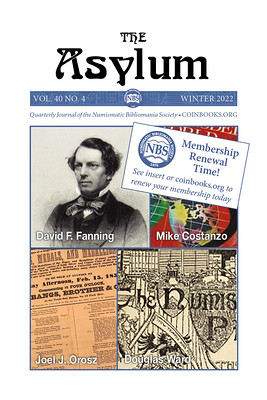 The Asylum's Winter 2022 issue is on its way to NBS members now. Thanks to all who contributed to our publication last year and I look forward to hearing from many of you next year. Please send all article contributions to
asylum@coinbooks.org.
The Asylum's Winter 2022 issue is on its way to NBS members now. Thanks to all who contributed to our publication last year and I look forward to hearing from many of you next year. Please send all article contributions to
asylum@coinbooks.org.
The Asylum Winter 2022
Vol. 40 No. 4
Table of Contents:
Charles Bushnell, New York Tokens, and Crumbs for Antiquarians
by David Fanning, with Joel J. Orosz and Len Augsburger
Trivia Quiz
By Charles Davis
A Catalog of Modern World Coins: R.S. Yeoman's Other
Book
By Mike Costanzo
ASSOCIATIONS: Autographs • Annotations • Inscriptions
Charles Ira Bushnell's Flandin's Catalogue of Coins and Medals: Part III, The Daniel E. Groux Broadside Sale, February 15, 1856
By Joel J. Orosz
Enigmatic Numismystique: The Mystery of L'Alouette: The Lark
of the 1909 ANA Convention
By Douglas Ward
Remember, while The E-Sylum is free to all, only paid members of the Numismatic Bibliomania Society receive our print journal, The Asylum. Print/Digital membership is $40 to addresses in the U.S., and $60 elsewhere. A digital-only membership is available for just $25. -Editor
To join NBS or renew your membership, see:
https://www.coinbooks.org/about/membership.html
KOLBE & FANNING AUCTION SALE 165 HIGHLIGHTS
Here are some additional highlights of the next Kolbe & Fanning numismatic literature sale. See an article elsewhere in this issue for more information on one of the lots. -Editor
Kolbe & Fanning December 3 Sale Highlights
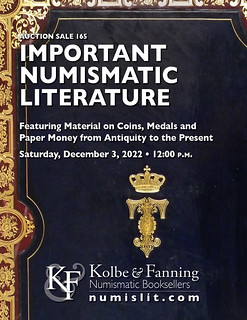 Kolbe & Fanning Numismatic Booksellers are holding our next auction sale on Saturday, December 3, 2022. The sale includes consignments from around the world, resulting in a wide variety of rare and out-of-print works on coins, medals, and paper money from antiquity to the present. Some highlights of the sale include:
Kolbe & Fanning Numismatic Booksellers are holding our next auction sale on Saturday, December 3, 2022. The sale includes consignments from around the world, resulting in a wide variety of rare and out-of-print works on coins, medals, and paper money from antiquity to the present. Some highlights of the sale include:
Lot 15: an original copy of Erich Boehringer's classic 1929 work on the coins of Syracuse, with 32 very fine plates of coins
Lot 25: Herb Kreindler's annotated set of catalogues from the CNG Triton series of auctions
Lot 53: Richard Payne Knight's rare and controversial work on the cult of Priapus, including a number of numismatic illustrations
Lot 120: Humberto Burzio's massive three-volume work on the medallic history of Buenos Aires
Lot 127: an attractively bound set of Dalton & Hamer's The Provincial Token-Coinage of the 18th Century, with a letter from Hamer bound in, accompanied by Hamer's work on private tokens in a matching binding
Lot 302: Tom Elder's 1917 catalogue of the collection of George C. Carlton, featuring important large cents and other U.S. coins, with five superb photographic plates
Lot 177: an exceptional set of the Beskrivelse over danske mynter og medailler (1791), the foundational classic on Danish coins, from the library of Princess Thyra of Denmark
Lot 360: a complete set of Mehl's Numismatic Monthly, arguably the Texas dealer's most significant contribution to serious numismatic study
Lot 444: W. Elliot Woodward's scarce 1884 catalogue of the J.N.T. Levick collection, illustrated with 4 fine heliotype plates focused on North American tokens
Lot 454: a remarkable group of 26 contributor copies of A Guide Book of United States Coins, signed by either R.S. Yeoman or Ken Bressett.
Register early to bid online
Bids may be placed via post, email, fax or phone, as well as online. Kolbe & Fanning use Auction Mobility as our third-party online bidding platform. Auction Mobility is an app-based platform allowing users the ability to participate in the sale through phones, tablets and computers. To register for the sale, bidders must go to
bid.numislit.com and sign up. Once you have set up an account, you may browse lots, place advance bids, or participate in the live sale online. Those wishing to participate on their devices can download the Kolbe & Fanning app through the Apple or Google Play Store. The sale has also been listed on Biddr and NumisBids.
The printed catalogue has been mailed to all active customers on our mailing list. As international mail speeds have been inconsistent, we encourage our foreign clients to consult the electronic catalogue in case their printed catalogue does not arrive promptly. A PDF of the printed catalogue has been posted to our main website at numislit.com/a> for those who prefer that format. Bids placed via post, email, fax or phone must be received by December 2, the day before the sale, in order for them to be processed. Advance absentee bids may also be placed at any time online at bid.numislit.com. Live internet bidding will be available during the sale itself through the same platform.
Kolbe & Fanning Numismatic Booksellers LLC is a licensed and bonded auction firm in the State of Ohio. For more information, please see the Kolbe & Fanning website at numislit.com or email David Fanning at df@numislit.com. To register for the sale, go to bid.numislit.com. We look forward to your participation.
To read the Catalogue PDF, see:
https://www.numislit.com/images/upload/kolbefanningsale165.pdf
To read the earlier E-Sylum article, see:
KOLBE & FANNING AUCTION SALE 165 ANNOUNCED
(https://www.coinbooks.org/v25/esylum_v25n46a02.html)
NEW BOOK: COINS OF CANADA 41ST EDITION
The new edition of Coins of Canada is now available. -Editor
2023 COINS OF CANADA – 41ST EDITION
by J.A. Haxby & R.C. Willey
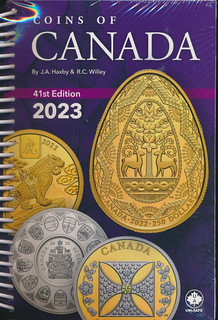 The 41ST edition of The Coins of Canada is a complete, one-volume library of Canadian coins, tokens and paper money, including major varieties.
The 41ST edition of The Coins of Canada is a complete, one-volume library of Canadian coins, tokens and paper money, including major varieties.
Features:
- Complete Canadian decimal coinage
- Pre-Confederation Provincial issues
- All Canadian Mint silver and gold collector's issues
- Canadian colonial tokens
- Dominion of Canada banknotes 1867-1935
- Bank of Canada paper money 1935 to date
- Latest retail market values by grade
- Detailed mintage figures and statistics
- Much historical background and pertinent information
- Condition Grading Guides for Canadian coins
- Includes a glossary of numismatic terms
For more information, or to order, see:
2023 COINS OF CANADA – 41ST EDITION
(https://coinstampsupplies.com/product/2023-coins-of-canada-41st-edition/)
NEW BOOK: REPUBLIC COINS OF INDIA VOL. 1
Bagchee, a book store in New Delhi, India is offering a new book on the Republic coins of India. -Editor
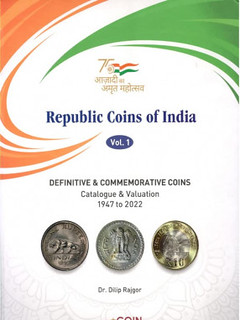 Republic Coins of India Vol. 1:
Republic Coins of India Vol. 1:
Definitive & Commemorative Coins
Catalogue & Valuation 1947 to 2022
Author: Dilip Rajgor
Format Hardcover
Date published: 06.11.2022
Edition: 1st ed.
Publisher: Rajgors
Language:English
ISBN: 9788195627202
Length: 154p.
For more information, or to order, see:
Republic Coins of India Vol. 1: Definitive & Commemorative Coins Catalogue & Valuation 1947 to 2022
(https://www.bagchee.com/books/BB137276/republic-coins-of-india-vol-1-definitive-commemorative-coins-catalogue-valuation-1947-to-2022)
NEW BOOK: CHITRESVARA-SIVA TYPE COINS
Here's another recent book on Indian numismatics - it was published last year but we haven't discussed it before. -Editor
Chitresvara-Siva Type Coins: Classification and Attribution
Devendra Handa
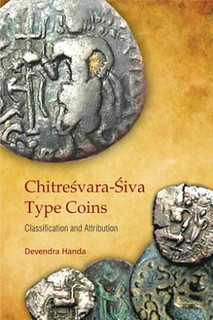 Copper coins bearing the figure of Siva holding trident with battle-axe in his right hand and leopard skin hanging from his left arm with early Brahmi legend around on the obverse and a deer facing an arched symbol with a railed tree at the back and some subsidiary symbols in the field on the reverse have a long history of their first discovery while digging a canal at Behat near Saharanpur in Uttar Pradesh in 1834.
Copper coins bearing the figure of Siva holding trident with battle-axe in his right hand and leopard skin hanging from his left arm with early Brahmi legend around on the obverse and a deer facing an arched symbol with a railed tree at the back and some subsidiary symbols in the field on the reverse have a long history of their first discovery while digging a canal at Behat near Saharanpur in Uttar Pradesh in 1834.
It was in 1891 that Alexander Cunningham deciphered the legend as Bhagavato Chatreswara Mahatana and because of the resemblance of their reverse device to the silver coins which he identified as those of the Kuninda people, Cunningham listed them as the Kuninda coins. John Allan, J.N. Banerjea, K.K. Dasgupta, M.C. Joshi and Ajay Mitra Shastri have attempted to modify the legend which has now been generally accepted to be Bhagavata(/o) Ch(i)tresvara Mahatmana(h). Chitresvara is the name under which Siva is still worshipped in Uttarakhand. Shastri brought to light four new specimens of these coins bearing on the obverse three-headed Siva sitting on Apasmara-purusha removing all doubts that the word Chitresvara stood for Siva.
Cunningham's attribution of these coins to the Kunindas has remained a dogma and many scholars, collectors and auction houses continue to follow it. I have studied hundreds of specimens of a big unpublished hoard from Garhwal and various institutional and private collections, fixed their provenience and classified them into three classes and five types bringing to light more than a hundred of their varieties attributing them to the Yaudheyas.
Title: Chitresvara-Siva Type Coins: Classification and Attribution
Author: Devendra Handa
Format: Hardcover
Date published: 02.12.2021
Edition: 1st ed.
Publisher: Aryan Books International
Language: English
ISBN: 9788173056598
Length: xiv+90p, Plates; 25cm.
For more information, or to order, see:
Chitresvara-Siva Type Coins: Classification and Attribution
(https://www.bagchee.com/books/BB136693/chitresvarasiva-type-coins-classification-and-attribution)
DENNIS TUCKER: AMERICAN SILVER EAGLES
In this article from Whitman Publishing, Dennis Tucker discusses the backstory of their upcoming book on American Silver Eagles. -Editor
Whitman Publishing's new Guide Book of American Silver Eagles, by Joshua McMorrow-Hernandez, will debut in December 2022, available from booksellers and hobby shops
nationwide. It is volume no. 27 in the best-selling Bowers Series
of numismatic references.
Here, Whitman publisher Dennis Tucker discusses the book and the popularity of
American Silver Eagle coins.
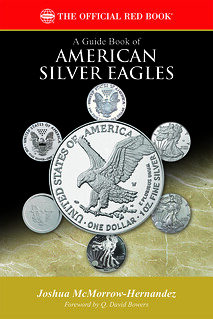 The American Silver Eagle is one of the most popularly collected U.S. coins today—and it has some of
the most passionate collectors. At Whitman Publishing headquarters we witnessed this in no uncertain
terms in 2018.
The American Silver Eagle is one of the most popularly collected U.S. coins today—and it has some of
the most passionate collectors. At Whitman Publishing headquarters we witnessed this in no uncertain
terms in 2018.
That year, under pressure to fit more and more America the Beautiful quarters, commemoratives, and other content into the Red Book, which was already bursting at the seams, we made a radical change to our coverage of bullion coins: We condensed the book's silver, gold, and platinum bullion from 21 pages into 8 pages. Instead of the usual highly detailed charts with mintages and pricing for each coin, we summarized each bullion program with a bit of historical information, a narrative giving typical price ranges for various formats (Proof, bullion strike, etc.), and brief descriptions and pricing for the key dates. The American Silver Eagles were trimmed down from two pages to one.
In hindsight, I can firmly say—the page savings were not worth it!
Almost immediately after the 72nd edition of the Red Book hit the shelves, we started getting phone calls
and emails from alarmed collectors. What happened to the Silver Eagles?
The Red Book is where I
always go for mintages.
You've made a big mistake!
It was the most vociferous, widespread, grassroots wave of feedback we've received on any Red Book subject in the nearly 20 years I've been Whitman's publisher.
Determined to make things right, we quickly laid out the American Silver Eagles in their previous highly detailed format and created a PDF to email or mail to anyone who contacted us with a complaint. You can rest assured that in 2019, in the 73rd edition of the Red Book, the American Silver Eagles were back to their two full pages of complete coverage!
Today these popular (and staunchly defended) coins occupy about two and a half pages in the 76th edition of the Red Book, and we're planning an expansion to four pages in the 77th edition, with pricing in more grades.
Avid collectors will be very pleased with Joshua McMorrow-Hernandez's new Guide Book of American Silver Eagles, the latest in-depth reference on these coins. It joins John M. Mercanti's American Silver Eagles: A Guide to the U.S. Bullion Coin Program, which has been a Whitman best-seller since its first edition debuted. Before Mercanti's book was published in 2012, collectors had only hobby newspapers and magazines, online forums, and coin-shop and coin-show conversations to guide them in their collecting, along with the Red Book's annual coverage of the latest coins and sets. There was no comprehensive book-length study.
Mercanti, working with professional numismatist Michael Miles
Standish, brought personal insight to
the study of American Silver Eagles—he was, after all, the designer and sculptor of the coin's original
reverse. Now Josh McMorrow-Hernandez, in the Guide Book of American Silver Eagles, expands the theme with even more historical information and interviews with Mint officials, silver-mine suppliers,
CCAC committee members, active dealers, experienced collectors, investment advisors, and others
involved in the nation's best-selling bullion coin program. He brings a journalist's hunger for answers and
a market analyst's focus on numbers, to show readers how to wisely build a valuable numismatic
collection (or, if they prefer, how to spend intelligently as a bullion investor).
In the summer of 2022, I informally polled 114 hobbyists for their opinions on American Silver Eagles. The results were interesting:
- 41 percent identify themselves as either a collector or an investor (or both) in American Silver Eagles (4 percent active collector; 1 percent active investor; 9 percent active collector and investor; 12 percent casual collector; 4 percent casual investor; and 11 percent casual collector and investor).
- 39 percent own some of the coins, but don't consider them a carefully assembled collection or a significant investment.
- 20 percent don't collect or invest in them at all, and don't own any.
Within these numbers we see a coin with broad presence in the hobby community. The data also show a population of casual buyers who might jump to more active collecting and investing.
It's anecdotally informative to look beyond the numbers and learn collectors' and investors' opinions and the feelings inspired by the American Silver Eagle.
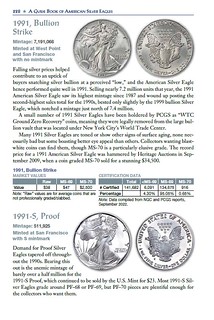 One collector of Liberty Walking half dollars said,
One collector of Liberty Walking half dollars said, The ASE is a great way to see a fully struck, larger-
sized Walker.
Another called them one of the most beautiful coins of the 1900s, if not the most
beautiful.
One hobbyist buys two every year to keep the set current. I'll pass them to my two kids someday.
On a
similar note: Mainly I buy them every year to give out as Christmas presents to some relatives and to
people at work.
For some, buying comes down to price: When I have extra cash, I get a few as bullion, but it depends on
the premium.
Highly recommend for investment. I go where the deal is. Both slabbed and raw. They
are a really super deal vs. generic silver dollars, plus have more silver in them. I will not buy classic
dollars at current prices.
And They are fun to own, and I salt some away when silver is low.
Of course, not every hobbyist is a fan of the American Silver Eagle. One young collector who favors
Barber silver coinage said, A coin has to be older than me to attract my attention.
A skeptic who
doesn't own any dismissed American Silver Eagles as just more hunks of silver.
Many, though, describe the coins as fun,
and those lucky enough to own the series' rarities love to talk
about them. Yes, I have the 1995-W . . . had it since 1996!
bragged one collector. Another reminisced,
I got the home-run from the Mint, the 2019 Enhanced Reverse Proof—which I traded for 13 Silver
Eagles and an ounce of gold!
Joshua McMorrow-Hernandez explores these angles of the American Silver Eagle and many more in his new book. This is a guide for the active buyer, a history for the numismatist, and an inspiration for those yet to join the field. Whether you're new to silver bullion or a longtime collector or investor, you'll find much to learn and profit from in the Guide Book of American Silver Eagles.
A Guide Book of American Silver Eagles, first edition.
By Joshua McMorrow-Hernandez; foreword by Q. David Bowers.
ISBN 0794849792. Softcover, 6 x 9 inches, 384 pages, full color.
Retail $29.95 U.S.
https://whitman.com/guide-book-of-american-silver-eagles/
To read the earlier E-Sylum article, see:
NEW BOOK: GUIDE BOOK OF AMERICAN SILVER EAGLES
(https://www.coinbooks.org/v25/esylum_v25n39a03.html)
NNP SYMPOSIUM 5 CONCLUDES
Newman Numismatic Portal Project Coordinator Len Augsburger provided the following report on this week's Symposium. -Editor
NNP Symposium 5 Concludes
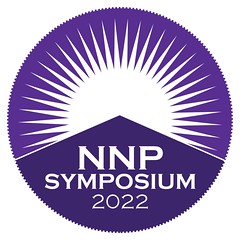 The NNP Symposium was held online, November 17-19. This was our fifth biannual event and brought together speakers on a wide array of topics including ancient, world and U.S. numismatics. Our feature presentation was an overview of the U.S. coins in the American Numismatic Society collection and included follow up comments from Jesse Kraft, the Resolute Americana Chair of American Numismatics at ANS.
The NNP Symposium was held online, November 17-19. This was our fifth biannual event and brought together speakers on a wide array of topics including ancient, world and U.S. numismatics. Our feature presentation was an overview of the U.S. coins in the American Numismatic Society collection and included follow up comments from Jesse Kraft, the Resolute Americana Chair of American Numismatics at ANS.
Video from all sessions will be made available in 2-3 weeks. All event registrants will receive a notification when videos are available. Past videos of all NNP Symposium presentations are freely available on Newman Portal. We look forward to our next Symposium, a hybrid event to be held in conjunction with the Central States Numismatic Society convention in April 2023.
Link to NNP Symposium videos on Newman Portal:
https://nnp.wustl.edu/library/multimediadetail/539070
My day job and E-Sylum editing duties kept me from attending many live events this week, but I was able to take an hour to participate in Saturday's forum "Your Club Publication: Creating and Sustaining Relevance" along with editors David Heinrich (The Cincinnati Numismatist) and Barbara Gregory (The Centinel, The Numismatist.) As a teaser for readers who missed it, I answered the #1 question I get from everybody: "HOW much TIME do you SPEND on The E-Sylum"?
I'll look forward to being able to watch the videos after their posting to the Newman Portal. For those who attended, what sessions resonated with you? -Editor
To read the earlier E-Sylum article, see:
NOVEMBER 2022 NNP SYMPOSIUM ANNOUNCED
(https://www.coinbooks.org/v25/esylum_v25n40a07.html)
VIDEO: AUBREY BEBEE
The David Lisot Video Library on the Newman Numismatic Portal can be found at:
https://nnp.wustl.edu/library/multimediadetail/522852
We highlight one of his videos each week in The E-Sylum. Here's one from 1986 with dealer Aubrey Bebee of Omaha, Nebraska. -Editor
ANA Numismatic Personality: Aubrey Bebee
Bebee purchased the McDermott specimen of the 1913 Liberty Head nickel at the 1967 American Numismatic Association Convention in Miami Beach. Bebee and his wife Adeline donated the coin along with the Idler 1804 Dollar to the ANA Museum. -Editor
To watch the complete video, see:
https://nnp.wustl.edu/library/book/557343
THE BOOK BAZARRE
THE CARNEGIE MUSEUM COIN SALES
Last week Kavan Ratnatunga asked for more information on the 1980s Carnegie Museum of Natural History coin sales. -Editor
Peter Preston-Morley writes:
"At the time I was quite heavily involved with this at Spink, who were instructed by the Museum in late 1982 to sell the collection, through its branches, for the benefit of collectors worldwide. At this remove I can't recall any material being offered by their then New York office on 445 Park Avenue, but the Australian operation sold material in their auction 9, Sydney, 9-10 March 1983, and 10, Melbourne, 14-15 July 1983, although very little in either sale was provenanced to Carnegie. There were some Ceylon tokens in Spink Australia 9, lots 878 thru 883, which might have been ex Carnegie.
"The first London sale was of British and World coins, in Spink Auction 30, 3 June 1983, lots 1 thru 549. Islamic coins were sold in Spink Auction 36, 30-31 May 1984, lots 331 thru 350. The US paper and commemorative medals were sold in Spink Auction 38, 10-11 October 1984, lots 830 thru 929. The world tokens, jetons and coin weights, several thousand pieces as I recall and including the best group of US tokens ever to have been offered at a London auction, were sold in Spink Auction 42, 6 March 1985, lots 425 thru 605. British tokens were sold in Spink Auction 43, 19 April 1985, lots 254 thru 328, which was acknowledged as being the final dispersal.
"Much of the material was formerly in the private collection of the late Bill Woodside (1905-78), who was the last full-time curator of the collection (old-timers among your readership may well remember him). Some pieces were acquired by exchange with the British Museum in 1963 and others from a bequest to Carnegie by S.K. Eastwood in 1966. The collection also included many pieces once owned by J. Verner Scaife."
Thank you! Looks like there were more sales that I was aware of - I recalled only the New York, London and Zurich sales. But it takes time to sell such a large collection. Ed Hohertz pointed me to Coin World, and I included a couple illustrations.
Woodside, Eastwood, and Scaife were prominent members of the Western Pennsylvania Numismatic Society but all had passed from the scene by the time I joined the group in 1978. From 1939 through 1948 Eastwood published an occasional numismatic periodicaL called Numisma where articles on many varied topics were published. The Volume 1, No. 3 issue from 1940 includes an article by Eastwood on the "Coffee Tokens of Ceylon." This rare journal is archived on the Newman Numismatic Portal. -Editor
To read Numisma on the Newman Portal, see:
Numisma [Sydney K. Eastwood]
(https://nnp.wustl.edu/library/publisherdetail/512908?Year=1940&displayAmt=50)
To read the earlier E-Sylum article, see:
NOTES FROM E-SYLUM READERS: NOVEMBER 13, 2022 : Carnegie Museum Coin Sales Question
(https://www.coinbooks.org/v25/esylum_v25n46a12.html)
NOTES FROM E-SYLUM READERS: NOVEMBER 20, 2022
Notes from Alan V Weinberg
Alan writes:
"Fast approaching 80, I've long firmly believed that attaining old age is influenced greatly by having a engrossing, long-lasting hobby. Al Johnbrier and Ed Kuszmar ‘s passing at, respectively, 87 and 81 are the most recent proofs. Harvey Stack lived well into his 90's as well as Henry Beckwith at 100 and Henderschott to 104. Absent bad habits like tobacco and excessive alcohol, there's little doubt a long life is significantly due to long involvement in numismatics.
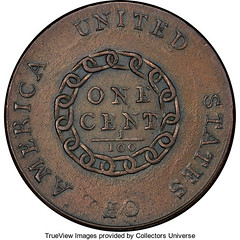 "Re the Clapp large cent collection being retained in its entirety by the Carnegie. Not true. Carnegie Curator Ray Byrne had engaged in trading or selling important large cents. I owned a superb AU 1793 S-3 Chain cent pedigreed to the Carnegie Clapp collection. Won out of a Heritage auction in the 1980's, and pedigreed to the Clapp collection only by an obverse photograph in their files, Heritage held it undelivered for several months until researcher Del Bland
"Re the Clapp large cent collection being retained in its entirety by the Carnegie. Not true. Carnegie Curator Ray Byrne had engaged in trading or selling important large cents. I owned a superb AU 1793 S-3 Chain cent pedigreed to the Carnegie Clapp collection. Won out of a Heritage auction in the 1980's, and pedigreed to the Clapp collection only by an obverse photograph in their files, Heritage held it undelivered for several months until researcher Del Bland cleared it
on paper as not proven to have been illegally deaccessioned by the Carnegie. It was the finest S-3 in the Clapp cent collection. Heritage auctioned it again out of my collection in Jan 2019. I do miss all my 1792-93's.
"Re the Rothschild numismatic background, there is a superb 1934 movie on the beginnings of the Family Rothschild history starring George Arliss and Robert Young ( of TV's Father Knows Best) and Boris Karloff as an antisemitic banker, appearing infrequently on TCM.
"On QDB's comments on series completion and the satisfaction/ depression on finishing it, there's another school of thought. I have long treasured collecting a numismatic subject that eludes completion, leaving the hunt
wide open and the lure of finding and acquiring that missing link
. Much more rewarding in my opinion."
Thanks on all counts. -Editor
To read the complete lot description, see:
1793 1C Chain, AMERICA, S-3, B-4, Low R.3, AU58+ PCGS Secure....
(https://coins.ha.com/itm/large-cents/1793-1c-chain-america-s-3-b-4-low-r3-au58-pcgs-secure-pcgs-35438-/a/1291-4314.s)
To read the earlier E-Sylum articles, see:
ALFRED EDWARD JOHNBRIER (1935-2022)
(https://www.coinbooks.org/v25/esylum_v25n46a03.html)
EDWARD KUSZMAR (1941-2022)
(https://www.coinbooks.org/v25/esylum_v25n46a04.html)
NOTES FROM E-SYLUM READERS: NOVEMBER 13, 2022 : Carnegie Museum Coin Sales Question
(https://www.coinbooks.org/v25/esylum_v25n46a12.html)
LOOSE CHANGE: NOVEMBER 13, 2022 : Evelyn de Rothschild Passes
(https://www.coinbooks.org/v25/esylum_v25n46a31.html)
LOOSE CHANGE: NOVEMBER 13, 2022 : The Joys of Completion
(https://www.coinbooks.org/v25/esylum_v25n46a31.html)
Silver Roll Find
Vic Mason of
Mamaroneck, NY writes:
"I've been reading in your last two issues about lucky finds made by collectors when they were young. I also had a few of those experiences when I was a boy growing up in Detroit in the early 1950s.
"But this letter is about chancing, a few years ago, to get rolls of pre-1965 silver quarters and halves from a friendly bank teller who knew I was a coin collector. She was close to retirement and did not understand the distinction between pre-1965 and post-1964 dimes, quarters, halves and dollars, even when I explained the issue of precious-metal and base-metal coinage to her.
"What happened was that a customer she didn't know brought in several rolls of quarters and halves that he had inherited from his late father. The customer must have realized, from a price guide, that none of the coins in the rolls was a numismatic rarity and so he just turned them in to the bank at face value, at a time when the market value of silver bullion exceeded $22.00 per ounce.
"When I took the coins home, I examined them for rarity and found none was rare but all were pre-1965 silver. So I returned them to the bank for my teller friend to contact the previous owner and get them back. I wrote a note for the teller and the owner explaining that the coins he had turned in at face value were worth several hundred dollars of silver bullion. But my teller friend was not there so I left the coins and note in the care of one of her younger colleagues, explaining the situation.
"Later I learned from her that she never got the coins and note -- but we did not pursue the matter since none of them could identify who the man was who had brought them in. At least, I assumed, someone was able to get the full value of the silver bullion."
"This find was not exciting, "numismatically speaking," but periodically I still see articles in Coin World in the "found in rolls" column about collectors finding individual pre-1965 silver dimes, quarters and halves hiding in rolls among the base-metal coinage. So seeing that there were still entire rolls of silver coinage "out there" in private hands, well into the Twenty-First Century, was quite a pleasant surprise."
To read the earlier E-Sylum article, see:
READER COIN DEAL STORIES
(https://www.coinbooks.org/v25/esylum_v25n46a10.html)
ANA Exhibit of Altered Meredith Notes
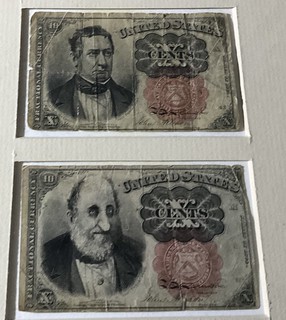 Pete Smith writes:
Pete Smith writes:
"I was looking through The Numismatist for November 1939, page 918, and the description of an ANA convention exhibit placed by Farran Zerbe: "A number of 10-cent Meredith fractional currency after being "improved" by an artist."
Nice find! Thanks. Who knows, maybe Michael Merrill's note was once handled by Zerbe and exhibited at the show. Of course, our readers uncovered several examples, so apparently this was something common at the time. -Editor
To read the earlier E-Sylum articles, see:
NOTES FROM E-SYLUM READERS: OCTOBER 16, 2022 : Altered Fractional Currency Portrait
(https://www.coinbooks.org/v25/esylum_v25n42a16.html)
BOSS TWEED CARICATURES
(https://www.coinbooks.org/v25/esylum_v25n43a12.html)
WILLIAM MORRIS MEREDITH (1799-1873)
(https://www.coinbooks.org/v25/esylum_v25n44a12.html)
Medallist George Mills Information Sought
"I have a request for information concerning George Mills. He was a medallist employed by the Soho mint from circa 1809 until his death in 1824. He produced many medals and is the subject of an in-depth look by me.
"At this point, I am particularly interested in his personal life, why he died along with his attempts to gain employment with the Royal Mint. He was employed at the Soho mint with many well known medalists including a few of the Wyons.
"I will be deeply appreciative of any information from your readers."
Great project. Can anyone help? -Editor
Moneymakers Book Sought
A website visitor writes:
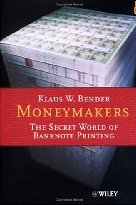 "I came by a publication done online by you about a book that caught my interest: Moneymakers: The Secret World of Banknote Printing by Klaus Bender.
"I came by a publication done online by you about a book that caught my interest: Moneymakers: The Secret World of Banknote Printing by Klaus Bender.
"Unsurprisingly I can't find a copy of the book in physical or digital formats. Would you happen to know where I could purchase a copy of this?"
I've found bookfinder.com to be a useful site for searching for used books. Five hits came up, including a couple in the United States. -Editor
For more information, or to order, see:
https://www.ecampus.com/moneymakers-secret-world-banknote-printing/bk/9783527502363
https://www.biggerbooks.com/moneymakers-secret-world-banknote-printing/bk/9783527502363
To read the earlier E-Sylum article, see:
MONEYMAKERS: THE SECRET WORLD OF BANKNOTE PRINTING BY KLAUS BENDER
(https://www.coinbooks.org/esylum_v12n16a06.html)
Book Sale at Numismatics with Kenny
In an email to customers, E-Sylum supporter Kenny Sammut writes:
"As the holiday season begins, Numismatics with Kenny eBay store is rolling out our Black Friday sale which begins today and runs through December 4, 2022. All numismatic books are 50% off and a significant number of listings are up to 15% off.
"I have added and will continue to add hundreds of Masonic Tokens and So-called dollar listings as well as many new US and world coins, medals, tokens, bullion and currency listings.
"Now is a great time to add to your collection or to purchase gifts for friends and family members who collect. Check out my tokens and medal's categories to find interesting items to gift to young collectors who are beginning to show an interest in collecting. World coins and exonumia collecting began my passion for the hobby when I was younger. There are so many subjects exonumia and world coins cover that you are likely to find items that will appeal to everyone. I personally enjoy the history behind US and world coins."
To visit Kenny's eBay store, see:
https://ebay.com/str/numismaticswithkenny
Bookaholics Anonymous?
Roger Moore writes:
"I thought readers might be amused with a saying I got in the mail."
Ain't it the truth! Thanks. -Editor
VOCABULARY TERM: MEDAL AWARD PROGRAM
Here's another entry from Dick Johnson's Encyclopedia of Coin and Medal Terminology. Well written. I added an image from an earlier E-Sylum article. -Editor
Medal Award Program. A plan for the administration of the bestowal of medals for some beneficial purpose to mankind or some field of endeavor. Such a plan includes how often the medal will be awarded, the criteria for selection of the recipients and the ceremony for the presentation. Often a fund is established (occasionally specified in a will) for the long-range bestowal of the medal on a periodic basis. The medal frequently takes on a memorial to either the benefactor or to some notable person in the field who is often chosen to be portrayed on the medal. Depending upon the amount of funds in the endowment, quite elaborate and handsome medals can be created, (designed and sculpted by prominent sculptors) or, if the funds are sparse, a stock design is chosen from the inventory of the medalmaker and customized only by adding the name of the award and the sponsor. This class of numismatic items, called award medals, serve the purpose of recognizing talent or achievement in some field of human activity.
The most famous of these award medals in existence – Nobel, Carnegie, Pulitzer, Caldecott, Newberry, Peabody – are known throughout the world and promote scientific, medical, literary or beneficial achievements such as lifesaving or peace. In contrast to these famous medals are the thousands of medal programs known only within their immediate field.
One of the most famous award medals is notable because of its benefactor. The will of Benjamin Franklin left a fund to establishing the Boston School Medal. It was to be awarded to boys (later to include girls, called the City Medal) for scholarship in Boston grade schools. But Franklin's original funds ran out, and the City of Boston assumed the sponsorship ultimately, but retained most of the tenants of Franklin's medal award program.
Award medal administration. Managing an award medal program is important. Often this management is undertaken by an organization with little experience. Sometimes, it is administered by a nonprofit organization, but is sponsored or the cost underwritten by a private corporation. See sponsor, sponsorship.
The administrators must oversee a board or committee in the selection of recipients, notification of these recipients, ordering the medals, the cases, the engraving, the certificates. Also, and of extreme importance is the award ceremony – often at a dinner – and publicity it generates to the benefit of the organization and the purpose of the award.
Award medal factors. There is a large initial cost for the development of a new award medal. This includes design, modeling, and die production. Once the dies are completed then medals need be struck. However with most award medal programs only a few medals are needed each year. Since there is also a substantial cost in setting up the press, it is not cost effective to strike only a medal or two each year. Instead an innovative plan was established to strike, say a ten-year supply and to retain these, either with the administrators or at the medallic company. Once the recipient is known it can be inscribed, finished and fitted with an appropriate case.
When most medal award programs are established the factor of rising costs are not taken into consideration. This kills more medal programs, particularly if the medal is made of precious metal, than any other reason. Costs of gold and silver fluctuate. Since most endowments are fixed, this means that gold medals are pure gold at the inception, but dwindle in time. Lesser karat gold is used, then gold filled, then goldplating as the administrators scramble to have the medals produced with the limited funds at their disposal. This leads to awarding the medal less often, and, ultimately, to abandoning the medal program altogether.
Numismatic concerns. Award medals are the contribution numismatics can make to the field of recognizing outstanding human achievement. Medals symbolize this recognition in a personal, permanent and artistic form. It encourages the medals to have a unique and attractive medallic design, to be created by talented, experienced artists.
Cataloging award medals, the function of numismatists, have traditional rules. The medals are dated the year they are awarded (not the year they were made). Thus the medal in general is described: dates/issued:
with the first and last date of their awarding. Usually the medal is first awarded the year it was created by its artist.
To read the complete entry on the Newman Numismatic Portal, see:
Medal Award Program
(https://nnp.wustl.edu/library/dictionarydetail/516286)
To read the earlier E-Sylum article, see:
THE 1859 JOHN J. FORD BOSTON SCHOOL MEDAL
(https://www.coinbooks.org/esylum_v16n47a28.html)
UNPUBLICIZED MYSTERY COLLECTIONS
American Numismatic Biographies author Pete Smith submitted this article on lost, unknown or unpublicized mystery collections. Thanks! Can readers add anything about these collectors or their collections? -Editor
In his book, The Rare Silver Dollars Dated 1804, Q. David Bowers describes two mysterious
owners of the Davis
1804 silver dollar.
In his era of the 1870's and 1880's, George Marion Klein of Vicksburg, Mississippi, was
somewhat of a
mystery man.
He amassed a large cabinet of fine and rare coins, but was
relatively unknown in numismatic circles.
James H. T. McConnell, Jr. a specialist in security and investment analysis, has collected coins
without publicizing his efforts.
There is still another mystery that Bowers did not mention.
Although George Klein may have been relatively unknown in numismatic circles, he was very prominent in the Vicksburg area. George Marion Klein was born in Vicksburg. Mississippi, on July 5, 1844, the son of John Alexander Klein (1812-1884) and Elizabeth Bartley Day Klein (1826-1909). The family was wealthy and socially prominent.
The father, John Alexander Klein, moved to Vicksburg in 1836. He established a jewelry
business there and expanded into lumber investment. Around 1840 he built a home for his family
he named Cedar Grove.
George was the first of the couple's ten children. In recent years the
Cedar Grove Mansion has been rehabilitated and turned into a bed and breakfast.
George took one of his servants with him as he served in the Confederacy during the Civil War. After the war he attended Heidelberg University in what is now Germany. He married Louise Harrison Balfour (1848-1909) in 1868. They had eleven children, of which four predeceased him.
After the war, John expanded his investments in railroads and banking. The Mississippi Valley bank was formed in November 1868 with a capitalization of $150,000. George M. Klein was cashier at the Mississippi Valley bank with his father as president until he retired in 1881. George was later president with his brother John A. Klein, Jr. as Cashier.
In 1880 George succeeded his father as treasurer of the Church of the Holy Trinity of Vicksburg. The Mississippi Valley Bank issued bonds to finance completion of the church building.
Grain speculation by A. K. Bonham & Co, of St. Louis resulted in large losses and the bank became insolvent in November of 1883. The bank was unable to pay the interest on the church bonds and George was replaced as church treasurer. This was just one of many unpaid creditors.
The Mississippi Valley Bank was the largest bank in Vicksburg at the time and its failure caused great distress in the community. The church was scheduled to be sold at auction in 1887 to pay off the debts but was saved by a presale settlement. Klein vowed to make up all the losses and consigned his coin collection to pay off debts.
He died at Vicksburg on December 22, 1923, and is buried at Cedar Hill Cemetery in Vicksburg
with his parents, spouse and children. Another section of the cemetery is soldier's rest
for
thousands of Confederate troops who died in the siege of Vicksburg.
Klein acquired the Davis 1804 dollar for $1200 from John Hazeltine in 1883. It was sold as part of the Vicksburg Collection by W. Elliott Woodward on March 21-25, 1888. With four Woodward sales, the Klein collection was dispersed.
James H. T. McConnell, father and son, were named for an ancestor, former Virginia Governor, James Hoge Tyler (1846-1925). The father, McConnell Sr. (1914-1989) was married to Jean Ellen Dupont, daughter of William DuPont and brother of John DuPont.
James H. T. McConnell. Jr. was born on September 1, 1949. He graduated from the University of Virginia; was married to anthropologist Mary Carter McConnell and divorced. His interests include investment management, horse breeding and philanthropy.
He acquired the Davis 1804 dollar through Stack's on November 21, 1971, when he was 22 years old. It was previously owned by Norton Simon.
While researching Purnie Moore, I came across newspaper articles about an exhibit touring through banks in Alabama.
The collection, recognized as one of the finest in the country, was a gift of the Alabama
Banker's Association to the people of Alabama and is being cared for by the Alabama Museum
of Natural History. The collection was purchased from the heirs of George M. Klein, a banker of
Vicksburg, Mississippi. Most of the coins were purchased for the collection between the years of
1850 to 1885, making the collection one of the oldest major collections in the south.
The exhibit had twelve panels with coins framed under glass. These were generally shown in a bank lobby for a day. They were first shown on July 25, 1953, and had been purchased the previous winter. Another article stated that they were purchased from the family of Raymond Birchett of Jackson, Mississippi.
By 1969, the display had grown to fourteen panels. Museum Director Dr. Walter B. Jones arranged for funds to acquire additional small collections to add to the Museum's collection around 1982.
Raymond Chandler Birchett was a prominent architect. He was born in Vicksburg. Mississippi, and lived in Jackson, Mississippi in 1953.
The family trees for George Klein and Raymond Birchett are well documented. George Marion Klein (1844-1923) had a sister, Clara Estelle Klein (1848-1932). She married Dr. Theophilus G, Birchett (1835-1904). They had a son Dr. John Alexander Birchett, Sr. (1867-1938) who was the father of Raymond Chandler Birchett (1902-1974). Thus, George Klein was the great-uncle of Raymond Birchett.
The Alabama Banker's Association coin collection was shown at the Alabama Numismatic Society convention in 1976, promoted by Purnie Moore. It was a newspaper article about that event that brought the collection to my attention.
Mystery #1: What happened to the collection? I did not find any mention of it on the Alabama Museum of Natural History website. My email request for information received no response.
Mystery #2: Why would it be given to a natural history museum when it is not natural history?
Mystery #3: If the Klein (Vicksburg) collection was sold at auction in the 1880's, how could the same collection be passed through the family estate and still be one of the finest in the country in 1952?
Everyone loves a good mystery, but at The E-Sylum we love solving them even more. Can anyone help with these questions? -Editor
To read the earlier E-Sylum article, see:
PURNIE MOORE (1907-2008)
(https://www.coinbooks.org/v25/esylum_v25n45a16.html)
STACK'S BOWERS OFFERS PICKENS COLLECTION
In the more-people-you-didn't-know-were-coin-collectors department is this release from Stack's Bowers about their upcoming sale of the collection of T. Boone Pickens. -Editor
Stack's Bowers Galleries is honored to have been selected to auction the coin collection of the
late T. Boone Pickens, influential businessman and financier. Pickens gained recognition in the 1980s through his
impact on the oil industry and eventually earned the nickname Oracle of Oil.
He went on to apply his expertise in
many other areas of the energy industry, advocating for natural gas, wind power, nuclear power and other alternative
energies. 1n 1997, he founded the hedge fund BP Capital Management (originally BP Energy Fund), which he
chaired for over two decades before he closed the company in 2018. In his later years, he became respected for his
generous philanthropy and even signed on to the Giving Pledge in 2010 at the behest of his friends Bill Gates and
Warren Buffett. Pickens was quoted as saying I enjoy making money, and I enjoy giving it away.
Pickens was also a passionate collector in many areas and his art collection was sold by Christie's in 2020 for over $20 million, a portion of which was donated to charity. Pickens' interest in numismatics was borne out of practicality and began with collecting unusual coins out of his pocket change, including such popular issues as Buffalo nickels and Morgan and Peace silver dollars. This fascination grew into a purposeful acquisition of Proof sets and Mint sets for himself and his family. Pickens' mother, Grace, also collected coins which he eventually inherited.
T. Boone Pickens passed away in September 2019 at the age of 91 after a long and fulfilled life. By this point his coin collection filled four bankers' boxes and exhibited an incredible breadth of types and international currencies. Stack's Bowers Galleries is proud to be able to share his collecting legacy through a special auction of these important numismatic mementos.
Coins from the Collection of T. Boone Pickens will be presented by Stack's Bowers Galleries in their December 2022 Collectors Choice Online Auction, with live bidding taking place on December 13 and hosted on the firm's website StacksBowers.com. The Pickens Collection spans a wide range of numismatic categories with a focus on Liberty Head gold and modern U.S. commemorative issues, as well as international items from Austria, Canada, Denmark, Great Britain, France, Mexico, the Ottoman Empire, Russia, and several other countries.
DELUXE GEORGII MIKHAILOVICH ALBUM
One of the highlights of the upcoming Kolbe & Fanning December 2022 numismatic literature sale is an album commemorating the National Numismatic Collection's acquisition of the Mikhailovich collection. -Editor
Deluxe Georgii Mikhailovich Album with Photographs, Letters, &c.
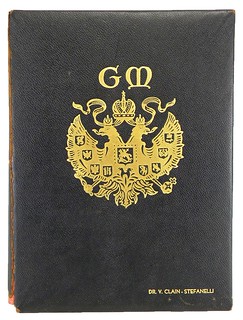 159 Kosoff, A. [editor]. THE MIKHAILOVITCH COLLECTION: RUSSIAN COINS AND MEDALS. Cincinnati: (Sol Kaplan), 1958. 4to, original padded black full morocco, gilt; DR. V. CLAIN-STEFANELLI impressed in gilt on front cover; red moiré doublures; original printed card covers bound in. Cover letter bound in, signed by 15 attendees of the June 28, 1960 opening of the exhibition accompanying the acquisition of the remaining collection of Grand Duke Georgii Mikhailovich of Russia through its donation by Willis H. duPont. 24 pages; illustrated throughout. Laid in are eleven 8 by 10 inch photographs taken at the opening, depicting Willis and Margaret duPont, Vladimir Clain-Stefanelli, Sol Kaplan, Rebecca Pollard Guggenheim, and others. Also laid in are letters to Dr. Clain-Stefanelli from Arthur A. Houghton III and J. Paul Getty (see comments). Spine worn; internally fine. $1000
159 Kosoff, A. [editor]. THE MIKHAILOVITCH COLLECTION: RUSSIAN COINS AND MEDALS. Cincinnati: (Sol Kaplan), 1958. 4to, original padded black full morocco, gilt; DR. V. CLAIN-STEFANELLI impressed in gilt on front cover; red moiré doublures; original printed card covers bound in. Cover letter bound in, signed by 15 attendees of the June 28, 1960 opening of the exhibition accompanying the acquisition of the remaining collection of Grand Duke Georgii Mikhailovich of Russia through its donation by Willis H. duPont. 24 pages; illustrated throughout. Laid in are eleven 8 by 10 inch photographs taken at the opening, depicting Willis and Margaret duPont, Vladimir Clain-Stefanelli, Sol Kaplan, Rebecca Pollard Guggenheim, and others. Also laid in are letters to Dr. Clain-Stefanelli from Arthur A. Houghton III and J. Paul Getty (see comments). Spine worn; internally fine. $1000
Dr. Vladimir Clain-Stefanelli's copy of the Deluxe Presentation Edition. Bound in at the beginning of the volume is a printed letter to the Smithsonian Institution from Willis H. duPont, dated 6/28/60 in ink, and featuring 15 original ink autographs, including those of Willis H. du Pont, Margaret F. du Pont, Rebecca Pollard Guggenheim, and other notables attending the gala event celebrating the presentation of the Georgii Mikhailovich collection of Russian coins and medals to the Smithsonian Institution.
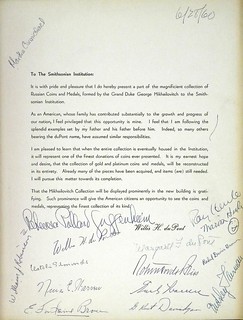 Loosely laid in the volume are eleven 8 by 10 inch official Smithsonian Institution publicity photographs. Among them are: a photograph depicting Clain-Stefanelli and duPont with a wall display of
Loosely laid in the volume are eleven 8 by 10 inch official Smithsonian Institution publicity photographs. Among them are: a photograph depicting Clain-Stefanelli and duPont with a wall display of Rubles 1720
in the background and Clain-Stefanelli holding the volume at hand, apparently having just accepted it from duPont; a photograph depicting wall displays of Russian Medals
and Square Grivnas 1720 with three original Georgii Mikhailovich volumes in the foreground; a photograph of several display cases; and various group and candid photographs depicting the attendees in formal attire, including the duPonts, Elvira Clain-Stefanelli, Sol Kaplan, and others (in one, three of the attendees are holding copies of the presentation volume).
Also present are two September 20, 1966 typewritten letters, signed in ink, to Dr. V. Clain-Stefanelli, as follows: 1) a letter, with the original Sutton Place mailing envelope, signed by J. Paul Getty, reading:
I am sorry to tell you that I did not acquire any ancient coins from the Niggeler Collection and consequently am unable to help the Smithsonian Institution. I hope some day to have the pleasure of meeting you personally
;
and 2) a letter from Arthur A. Houghton III concerning his collection of Seleucid coins.
Concerning this famous collection, Elvira Clain-Stefanelli wrote in 1986, in Perspectives in Numismatics: Studies Presented to the Chicago Coin Club, that:
Mr. Willis H. duPont, the scion of one of our nation's leading families, decided to share with us one of the most outstanding collections of Russian coins and medals outside of the Hermitage in Leningrad. The 9,739 silver and copper coins and early silver ingots, the 371 gold and 64 platinum coins, and the 1,227 silver and 32 gold and platinum medals, depicting the history of Russian monetary evolution from the 13th to the 20th century, were bequeathed by Mr. duPont over a period of ten years to the Smithsonian. These coins had an interesting history in themselves; they belonged originally to the Grand Duke Georgii Mikhailovitch, a Romanov Prince, a cousin of the last Czar Nicholas II.
The Grand Duke did not survive the turbulent changes of the Russian Revolution, but his wife and daughters, Princess Xenia and Princess Nina succeeded in fleeing the country; the collection followed them through their peregrinations until it reached the United States. My husband and I heard of it in the early 1950s in New York; later the collection was acquired by Mr. Edward Gans, who with the help of his Russian wife and of Mr. James Teodorovici succeeded in cataloguing the large holdings. The collection changed hands and was ultimately acquired by Mr. Willis duPont, who in 1958 began to donate it, in yearly installments, to the Smithsonian. It is undoubtedly the finest collection of modern Russian coins outside Russia.
Left unmentioned, it was Cincinnati coin dealer Sol Kaplan who had purchased the collection from Gans, and, in a cooperative venture with Abe Kosoff, eventually sold the collection to duPont. Ex Kolbe Sale 100, lot 56.
For more information on the sale, see:
https://www.numislit.com/
To read the earlier E-Sylum article, see:
KOLBE & FANNING AUCTION SALE 165 ANNOUNCED
(https://www.coinbooks.org/v25/esylum_v25n46a02.html)
NUMISMAGRAM SELECTIONS: NOVEMBER 20, 2022
Numismagram's Jeremy Bostwick sent these four highlights from his recent addition of new material to his website. For all of the new items, including a great George Washington portrait medal, a few Christopher Columbus medals, a silver medal relating to colonial Delaware, and token with a cute cat on it, please visit https://www.numismagram.com/inventory. -Editor
101997 | UNITED STATES & GREAT BRITAIN. Treaty of Paris/Peace of Versailles white metal Medal. Issued 1783. Commemorating the end of the American Revolution (42mm, 26.39 g, 12h). By J. Reich. SIC HOSTES CONCORDIA INVGIT AMICOS (thus concord unites enemies as friends), allegory of Peace standing right, holding olive branch and clasping hands with allegory of America standing left, holding cap on pole; behind Peace is the shield of the Netherlands, behind America is the shield of the 13 colonies; between them are the shields of Great Britain (as the Irish harp), Spain (castle), and France (three lis); in background to left, bombardment from Port Mahón; in background to right, bombardment from Gibraltar; radiant Eye of Providence above; in exergue, PRVDENTIA & FATIS (by prudence and the fates), veduta intended to represent Paris, where the treaty was signed / ENSIBVS EX MARTIS LVX PACIS LÆTA RESVRGIT (from the swords of Mars, the joyful light of peace shall rise again), allegory of Peace standing slightly left, holding olive branch and cornucopia, and trampling upon fallen Mars (representing war), with broken sword; in background to right, bombardment from Gibraltar; to upper left, radiant sun with angel flying right, holding wreath and trumpeting the words FIAT PAX (let there be peace); in exergue, OPE VULCANI (by the aid of Vulcan [i.e., through hard labor and industry]). Edge: Plain. Betts 610; BHM 255; Eimer 804; cf. Pax in Nummis 655 (silver); van Loon supp. 592. PCGS MS-64. Exceptionally brilliant and prooflike, with intense mirroring.
Incredibly popular type relating to the American Revolution and subsequent independence from Great Britain. Tied with just two others at this level across both major grading services (both are PCGS), and with just one certified finer (NGC MS-65). However, it is easy to see that the present example is a premium-quality piece for the grade assigned, as it is superior to the other two MS-64s, and is actually more attractive than the MS-65 as well. For reference, the latter specimen, which realized a total of $3,960 in Heritage's September 2017 Long Beach sale, is now available via HA's best offer tool, with its current owner wanting at least $6,000. $2,895.
In his indispensable reference, American Colonial History Illustrated by Contemporary Medals, C. Wyllys Betts comments on this type, quoting Mr. W. S. Appleton (from the American Journal of Numismatics), in that the "…reference is here made to the English loss of Port Mahon, with the island of Minorca, and their successful defence of Gibraltar, both which events occurred (sic) during the War of American Independence." He also quotes Mr. Parsons, who felt that "…from the variety of designs and inscriptions which are crowded upon the two sides of the Medal, it seems as if the author proposed to write a poem in celebration of the Peace, but finally concluded to publish a Medal." Adding even more intrigue and importance, the Dutch government presented a white metal example of this type, the same as the medal presented here, to John Adams in 1787, which later found its way into the collection of the Massachusetts Historical Society.
Great piece! -Editor
To read the complete lot description, see:
101997 | UNITED STATES & GREAT BRITAIN. Peace of Versailles white metal Medal.
(https://www.numismagram.com/product-page/101997)
102170 | UNITED STATES. Louisiana Purchase/St. Louis International Exposition silvered bronze "so-called" Dollar. Issued 1904 (40mm, 26.16 g, 12h). By the Holy Brothers. LOUISIANA PURCHASE / 1803, oval medallions of Thomas Jefferson, facing slightly left, and of Napoléon, facing left; between them, shield bearing stars and stripes, and surmounted by an eagle, with wings spread and head left, perched facing / WORLD'S FAIR ST LOUIS 1904, three allegorical figures (one male, two female) facing left among the clouds; the male figure trumpets and holds a torch, while one female clasps his shoulder and another, nude, holds an oval shield; at a distance to lower left, aerial view of the expo grounds. Edge: Some uneven silvering, otherwise plain. socalleddollar site, as unlisted #66; Krueger 225, Hendershott 30-260. Choice Mint State. Soft satiny-argent surfaces, with almost no breaks to the silvering. A very rare and seldom encountered type, with the alluring Art Nouveau artistry that is typically seen from the Holy Frères (brothers), who are more commonly known numismatically for their Swiss shooting medals from the same time period. $895.
Billed as the Louisiana Purchase Exposition, as it commemorated the 100th anniversary of the massive land transaction between the United States and France, the fair covered an enormous area, taking visitors nearly a week to explore its offerings.
To read the complete lot description, see:
102170 | UNITED STATES. St. Louis Expo silvered bronze "so-called" Dollar.
(https://www.numismagram.com/product-page/102170)
101884 | UNITED STATES & NETHERLANDS. Pilgrims/the Mayflower bronze Medal. Issued 1920. Commemorating the 300th anniversary of the "Pilgrim Fathers" and the Mayflower (59mm, 77.77 g, 12h). By C. J. van der Hoef. THE PILGRIM FATHERS / 1620 1920 / 300 JARIGE HERDENKING, frontal view of the Mayflower, with oval shield at stern; to left, shield with arms of the Netherlands; to right, shield with stars and stripes / THE SPOT WHERE JOHN ROBINSON LIVED TAUGHT AND DIED / JAN P?S?NSHOF, facade of the Jan Pesynhof Almshouse in Leiden, where John Robinson resided. Edge: Plain. Rulau E79A. Gem Mint State. Olive-brown surfaces, with a sublime matte nature. $295.
Seeking a freedom from religion and a separation from the Church of England, those who would become known as the pilgrims and who would form a fledgling settlement in what is now Massachusetts, departed England and first set up in Leiden in the Dutch Republic, where religious freedoms were allowed. While there, the pilgrims received leadership from John Robinson, who is regarded as one of the "Pilgrim Fathers," along with Robert Browne and Henry Barrow. A group of 102 pilgrims set out for the New World in the fall of 1620, hoping to establish a new promised land, though they arrived in the area that is now Cape Cod in mid-November, a month later than expected.
Given the lack of knowledge of the area as well as basic survival skills and food gathering/harvesting, half of the colony did not survive the initial harsh winter. Were it not for assistance provided by local indigenous peoples, it is quite possible that the entire group of pilgrims would have died from exposure, disease, and hardship. The following fall, in commemoration of their arrival, the remaining pilgrims celebrated with a feast of thanksgiving, along with many local natives, in what has now been declared the initial Thanksgiving, serving as the forerunner to the national holiday.
A very pleasant design. Happy Thanksgiving! -Editor
To read the complete lot description, see:
101884 | UNITED STATES & NETHERLANDS. Pilgrims/the Mayflower bronze Medal.
(https://www.numismagram.com/product-page/101884)
102243 | UNITED STATES. Dog on flowers bronze Love Token. Engraved on a Two Cent Piece (23mm, 5.75 g, 11h). Head of dog left atop background pattern of flowers and within border of concentric circles; all engraved upon the obverse. Edge: Plain. Cf. KM 94 (for host coin). Engraving: About Uncirculated; Host coin: Choice Very Fine. Warm brown surfaces, with a few light marks and deposits on the reverse. A great animal pictorial type on a lesser-encountered host. $225.
Neat item. Nice work. -Editor
To read the complete lot description, see:
102243 | UNITED STATES. Dog on flowers bronze Love Token.
(https://www.numismagram.com/product-page/102243)
FORREST FENN'S TREASURE CHEST OFFERED
Heritage will be selling the contents of author Forrest Fenn's famed "Treasure Chest" that sent so many treasure hunters into the Rocky Mountains in search of it. Here's the press release. -Editor
Heritage Auctions Opens Forrest Fenn's Treasure Chest to Collectors
This time, at least, the hunt for Forrest Fenn's treasure won't be so challenging. What remains from that famed chest hidden in the Rocky Mountains – for a decade, the stuff of dreams and countless news stories – is now available with the simple click of a button.
On Friday Heritage Auctions opened bidding on Forrest Fenn's Treasure, which closes Dec. 12. The thrill of the chase is prolonged another month as collectors once again vie for 476 gold pieces, coins, jewelry and other items found in the chest that was planted in 2010 by the author, decorated fighter pilot and art dealer. Fenn, a native of Temple, Texas, saw the treasure hunt as a fitting farewell to a life well lived – and, he said, as a way to encourage people to get off their couches.
Before and even after the chest's discovery in 2020 by Jack Stuef, Fenn's story became a nearly mythic tale that began with a simple poem in his memoir The Thrill of the Chase, which contained nine clues to the chest's whereabouts. It began: As I have gone alone in there/And with my treasures bold/I can keep my secret where/And hint of riches new and old.
Fenn believed that after he hid the treasure in the mountains, more than 300,000 people searched for what he called his title to the gold.
That title was officially transferred to Stuef on June 11, 2020, when the 32-year-old Michigan native and medical student met Fenn in Santa Fe, N.M. According to an affidavit signed by Karl Sommer, Fenn's attorney, Forrest reviewed all of the contents of the Treasure Chest, confirmed it was the same chest and contents he hid in 2010, and accepted the Treasure Chest
from Stuef. At that same meeting, Sommer wrote, Forrest gifted the Treasure Chest and its contents
to the man who found it.
In his affidavit, Stuef confirms that on Sept. 19, 2022, he sold the chest and contents to Tesouro Sagrado Holdings, LLC, which now brings the majority of Fenn's treasure to auction. The consignor has kept the chest, the dragon bracelet and a handful of other items. The remainder of the chest's contents is available in this auction.
Every piece here – from a Liberty Half Eagle to a centuries-old Columbian gold ornament to even a gold flake or a pair of scissors – will demand the attention of those who heard tell of the hunt for this fabled chest. But this auction contains its share of sizable, significant finds, too – among them a 549-gram Alaskan gold placer roughly the size of a hen's egg.
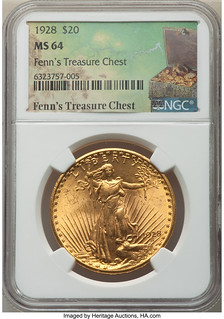 The auction contains hundreds of coins, among them a 1928 Saint-Gaudens Double Eagle, Liberty Double Eagles, Liberty Half Eagles, Indian Eagles and more. Each coin in this event is graded and resides in an NGC holder noting its place in history as a selection from
The auction contains hundreds of coins, among them a 1928 Saint-Gaudens Double Eagle, Liberty Double Eagles, Liberty Half Eagles, Indian Eagles and more. Each coin in this event is graded and resides in an NGC holder noting its place in history as a selection from Fenn's Treasure Chest.
Fenn also stashed centuries-old gold jewelry in the chest, including a Diquis/Greater Chiriqui Frog Pendant from Costa Rica or Panama, circa 700-1000 AD, and a gold pectoral meant to represent the sun, which comes from Columbia circa 200-600 AD. But not all that glitters is gold in this event: One collector will walk away with the completely intact, wax-sealed small glass jar purportedly containing at least Fenn's autobiography.
Wrote Fenn, I also wanted to include something personal with the treasure because maybe the lucky finder would want to know a little about the foolish person who abandoned such an opulent cache. So I placed a 20,000-word autobiography in the chest. It's in a small glass jar and the lid is covered with wax to protect the contents from moisture. The printed text is so small that a magnifying glass is needed to read the words. I tried to think of everything.
Discord has arisen among seekers of the jar over the ultimate question: Should its seal be broken? Whatever the answer, its contents will be known only to the collector who decides finally to break the wax seal and open the jar.
And what he didn't think of was captured in Daniel Barbarisi's extraordinary book Chasing the Thrill: Obsession, Death, and Glory in America's Most Extraordinary Treasure Hunt, released in paperback earlier this year. Barbarisi tells how a curiosity
became a full-blown craze
thanks to the Today show in 2013; how blogs led to national news stories led to documentary films led to more memoirs and a frenzy that didn't die down even after the chest was discovered in 2020. Indeed, if anything, there remains a Forrest Fenn fever unbroken by the chest's discovery in June 2020 or Fenn's death three months later at the age of 90.
The chest, he wrote on his website, was under a canopy of stars in the lush, forested vegetation of the Rocky Mountains and had not moved from the spot where I hid it more than 10 years ago.
The chase might have ended. But the thrill most certainly has not.
To browse the sale, see:
2022 December 12 Forrest Fenn's Treasure US Coins Showcase Auction #63197
(https://coins.ha.com/c/auction-home.zx?saleNo=63197)
HOLABIRD WELLS, FARGO TREASURE CHEST
Forrest Fenn's Treasure Chest is real, but it was conceived in a work of fiction. But the December 3, 2022 Holabird sale offers a true-life California Gold Rush gold chest found and recovered from a real-life shipwreck. Pictured below with the artifact are Bob Evans and Fred Holabird. -Editor
This is the only known piece or otherwise of an original Wells, Fargo gold treasure box from the California Gold Rush of the 1850s. With this box lid, it is very apparent that Wells, Fargo did not want anyone to mistake the ultimate destination of New York in a shipment of California gold. It is made in the same style as the Alsop & Co. and Sather & Church treasure boxes found within the S.S. Central America artifact group from the confines of the gold room. When the box was harvested, the lid was upside down and the wording on this unique and greatly historical item was not known until the first phase of artifact examination.
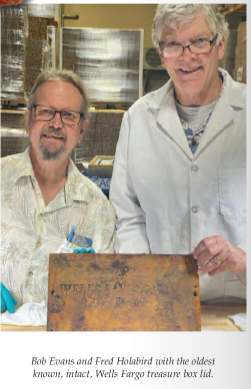 As part of the original artifact examination and appraisal team, I (FH), was overwhelmed by excitement when I saw a slide of this box lid. In all my years of working with California Gold Rush history (nearly 50), never had I or my colleagues, including Dr. Bob Chandler of the Wells, Fargo History Room, every heard of, seen a part of or knew what an original Wells, Fargo treasure box looked like from the California Gold Rush.
As part of the original artifact examination and appraisal team, I (FH), was overwhelmed by excitement when I saw a slide of this box lid. In all my years of working with California Gold Rush history (nearly 50), never had I or my colleagues, including Dr. Bob Chandler of the Wells, Fargo History Room, every heard of, seen a part of or knew what an original Wells, Fargo treasure box looked like from the California Gold Rush.
The two of us were ecstatic, and I immediately shared the photo in the first public lecture given on the artifact discovery, all of which was locked up since 1991 or 2014. When the slide of the Wells, Fargo lid was first shown that day, the entire room gasped in astonishment.
The treasure boxes subject to this artifact group, which shipped gold from the west coast to the east coast and/or foreign countries, are distinctly different than the next generation of treasure boxes, which were specifically designed for use on stagecoaches.
To bid in the sale, see:
https://holabirdamericana.liveauctiongroup.com/SS-Central-America-Shipwreck-Artifacts-Auction-Part-I-December-2022_as86130?t=HESSCAI4
To read the earlier E-Sylum article, see:
S.S. CENTRAL AMERICA ARTIFACT CATALOGS
(https://www.coinbooks.org/v25/esylum_v25n45a02.html)
THE BOOK BAZARRE
Bowers Serieswas written by award-winning author Joshua McMorrow-Hernandez, who presents these silver coins to both collectors and investors. 384 pages. Order your copy online at Whitman.com , or call 1-800-546-2995.
WBNA OFFERS EAST AFRICAN RARITIES
World Banknote Auctions offers several East African Rarities in their upcoming Auction 35. Here's a blog post by owner Dennis Hengeveld with more details. -Editor
Offered in World Banknote Auctions sale 35 as lot number 35136 is a major African rarity from the British colony of East Africa. Dated 15th December 1921 and issued at Mombasa (in present-day Kenya) this 200 Shillings or 10 Pounds is listed in the Pick catalog of World paper Money as Pick-17. It is the third highest denomination of the 1921 series issued for East Africa. It is preceded by a series issued under the East Africa protectorate and a rare series issued in 1920 which was quickly replaced by this series denominated in Shillings in 1921. A classic African colonial banknote, this example is one of just three in the PMG population report and the only example certified by PMG as having Exceptional Paper Quality
, confirming its status as an original piece. While two examples grade finer in the PMG population report (finest at 64) neither of those are graded with the EPQ status.
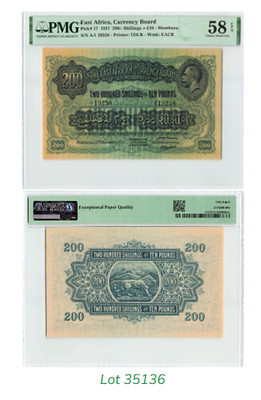 Banknotes of East Africa, which were issued for circulation until the 1960s are avidly collected by advanced collectors. The series offers a wide variety of designs and denominations, with the majority of notes bearing the portrait of the British Monarch (King George V, King George VI and Queen Elizabeth II). They were issued at a time when the region saw much economic and development, developing from a relative backwater of the British Colonial Empire to one of its most important colonies. The region as a whole had seen some colonization from Portugal and Oman prior to the 19th century, but it was only during the
Banknotes of East Africa, which were issued for circulation until the 1960s are avidly collected by advanced collectors. The series offers a wide variety of designs and denominations, with the majority of notes bearing the portrait of the British Monarch (King George V, King George VI and Queen Elizabeth II). They were issued at a time when the region saw much economic and development, developing from a relative backwater of the British Colonial Empire to one of its most important colonies. The region as a whole had seen some colonization from Portugal and Oman prior to the 19th century, but it was only during the Scramble for Africa
, where European powers divided Africa into various colonies that the region would come firmly in British hands. Initial European colonization was done under auspices of the private Imperial East Africa Company, which was formed in 1888. In 1893 the British government took over, which divided the region into the East Africa Protectorate and the Uganda Protectorate. In 1920 the East Africa protectorate would become British East Africa.
British East Africa was officially known as the Colony and Protectorate of Kenya. Nairobi was its capital, but the largest city was Mombasa, which around 1921 had a population of 32,000. Mombasa was located on the coast and was first settled as a trading town on an island as early as 900 A.D., with the first mention of the city coming from a Moroccan traveler in the 14th century. Mombasa was an important port city for trade with the Indian subcontinent, and by 1920 the city and colony had a large number of Indians, who outnumbered Europeans about 2.5:1. The Arab population was similar to the Europeans. Native Africans formed by far the largest group, with over 2,000,000 estimated to live in the colony under British rule at the time the note offered in this sale was issued.
Before the region issued its own coins and currency the Indian Rupee circulated in the region, the direct result of the trade with India and stressing its importance. The East African Rupee was introduced in 1906, then replaced in 1920 by the East African Florin, and finally in 1921 by the East African Shilling. First banknotes were introduced in 1906 (but dated 1905) and consisted of an entire series of uniface notes from 5 Rupees to 1000 Rupees. The second series was introduced in 1912 and were similar in design to the first series, although it is believed this series (which was issued with several dates) only went up to the 500 Rupees. These notes were not demonetized until 1930 allowing ample time for holders of these notes to exchange them for updated notes.
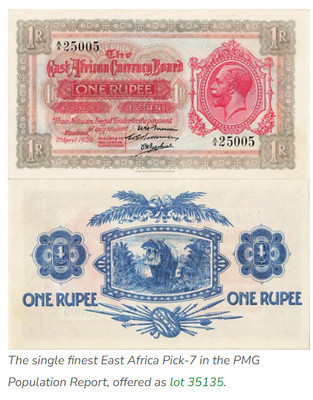 As a result of this lengthy period to exchange them most notes from East Africa denominated in Rupees are extremely rare. The only one that is available somewhat frequently is a 1 Rupee, issued in 1920 with the portrait of King George V on the front and a hippopotamus (Pick-7). We offer the single finest example of this type in the PMG population report (graded PMG 58) in sale 35 as well, as lot 35135.
As a result of this lengthy period to exchange them most notes from East Africa denominated in Rupees are extremely rare. The only one that is available somewhat frequently is a 1 Rupee, issued in 1920 with the portrait of King George V on the front and a hippopotamus (Pick-7). We offer the single finest example of this type in the PMG population report (graded PMG 58) in sale 35 as well, as lot 35135.
While not of the same rarity as the 200 Shillings, the condition of this piece is phenomenal, and it is certainly the nicest of this type we have handled. As mentioned previously the East African Rupee was briefly replaced by the East African Florin (which included a 1 Rupee of the same design, up to a 500 Rupees). This series was then replaced, on par, by the 1921 issue denominated in Shillings and Pounds. While not known at the time, this would be the final series issued at Mombasa, as all later issues were issued at Nairobi.
The 1921 series also includes a 1 Rupee (of the same design as the 1920 issue but now as 1 Shilling), a 5 Shillings, 10 Shillings, 20 Shillings, 100 Shillings, 200 Shillings (offered by World Banknote Auctions), 1000 Shillings and 10,000 Shillings. While the lower denominations no doubt circulated in general commerce, it is believed that the higher denominations were reserved for larger transactions and interbank transfers, as they represented large sums of money that would have little use in day-to-day transactions. Later issues under King George VI would include a 1000 Shillings and 10,000 Shillings (both extremely rare) but the 200 Shillings offered in this sale would be the last of that denomination issued in British East Africa. To further illustrate the lack of demand for high denominations, the last two series issued under Queen Elizabeth II would no longer include denominations above 100 Shillings (or 5 Pounds).
The 1933 issue for East Africa uses the same basic design as the 1921 series, but was issued at Nairobi. This series did not include values above the 100 Shillings, as the supply of higher denominations provided by the 1921 series was deemed sufficient for the demand at the time. In fact, demand for a 200 Shillings (or 10 Pounds) note was so low that this denomination would never be printed again after the 1921 issue.
For the advanced collector of British East Africa this offers an extremely infrequent opportunity to acquire a high grade example of this rarity. In the philatelic world stamps of this region have been avidly collected since they were first issued, and in today's numismatic world the banknotes of the region have caught on. They are some of the most popular and iconic series of banknotes an advanced collector can acquire. Over the past century the region has seen rapid development, and trade and tourism now play an important role to its economy, with Kenya visited by millions of tourists each year to enjoy the spectacular scenery and wildlife. World Banknote Auctions is honored to offer this rarity in fantastic grade, which is offered in session 1 of sale 35, with live bidding on December 1st at 1 PM EST / 10 AM PST. Besides the East African rarities discussed above the two sessions of sale 35 offer almost 1000 lots from around the world, ranging from modern notes in high grade to rarities seldom seen at public auction.
To read the complete article, see:
World Banknote Auctions offers East African Rarities
(https://www.worldbanknoteauctions.com/news/east-african-rarities/)
NUMISMATIC NUGGETS: NOVEMBER 20, 2022
Here's a selection of interesting or unusual items I came across in the marketplace this week. Tell us what you think of some of these. -Editor
Canute (1016-35), Penny, Helmet type (c.1024-1030), Lincoln mint, moneyer Swartbrand, pointed helmet bust left, sceptre in front, legend surrounding, +CNVT RECX ?. Rev, short voided cross with pellet and annulet centre, pellet in annulet in each angle, all within linear circle, reads +SPPE?RT?BR?D O LI, 1.11g (S.1158; N.787; BMC XIV; SCBI 14 [Copenhagen], Part IIIb, 1877-78).
Toned, a fully centred strike with underlying mint lustre, some obverse doubling, reverse strong with a quickly recognisable moneyer mint script. Good very fine, eye appeal.
From the Baldwin's website offerings. Alas, it's already been sold. -Editor
To read the complete item description, see:
CANUTE (1016-35), PENNY, POINTED HELMET, LINCOLN
(https://www.baldwin.co.uk/product/canute-1016-35-penny-pointed-helmet-lincoln/)
ND (1847) Cambodia. 2 Pe / 1/2 Fuang. Norodom I. Billon. Uniface. KM-11. 12.3mm. 1.3g. The obverse features a Hamza bird, Cambodian caption above its head. The reverse is blank.
From the American Numismatic Association eBay store. Interesting crude design, reminiscent of Celtic coinage. -Editor
To read the complete lot description, see:
ND (1847) Cambodia. 2 Pe / 1/2 Fuang. Norodom I. Billon. Uniface.
(https://www.ebay.com/itm/314232321164)
1964-1965 New York World's Fair. Official Medal. By Medallic Art Company. Bronze. Specimen-65 (PCGS).
64 mm. Obv: World Globe (the "Unisphere") with dates below and inscriptions around the periphery. Rev: New York City Arms. Edge: Stamped MEDALLIC ART CO. N.Y. BRONZE at 6 o'clock. PCGS has mounted this medal with the reverse up in the holder.
Nice medal, great relief. My family didn't attend, but it would have been an interesting experience. From the Stack's Bowers December 2022 Tokens & Medals Collectors Choice Online Auction. -Editor
To read the complete lot description, see:
(https://auctions.stacksbowers.com/lots/view/3-1060OF/1964-1965-new-york-worlds-fair-official-medal-by-medallic-art-company-bronze-specimen-65-pcgs)
Country: Mauritius
Denomination: 25 rupees
Catalog #: 32b
Year: {1967}
Grade: UNC (uncirculated)
Other Info African banknote featuring Queen Elizabeth II at right; scarce replacement note with Z/1 prefix! ONLY ONE PIECE IN STOCK!
Coloration: Green w/pink underprint.
Depictions: Queen Elizabeth II at right on front; farmer driving oxcart with bay and mountains in background on back.
Note Size: 6" x 3 1/2"
Watermark: Yes.
Security Features: Watermark, security strip.
This colorful note really stood out to me in the Richard J. Reed World Currency Fall, 2022 Newsletter. Beautiful piece. -Editor
To read the complete item description, see:
https://www.currencybanknotes.com/banknotedetail.php?id=10109
Country: Movie Prop Money
Denomination: 10 dollars
Catalog #: PN-UL-USA-FG-fp10a
Year: (2020- bill date 1950B)
Grade: EF (extremely fine)
Other Info: These prop bills, serial number G87N40S6K8, are said to have been used in the TV series "Fargo" (season 4, the one starring Chris Rock) and are not illustrated in Fred Reed's "Show Me The Money" catalog. These notes bear the words "MOTION PICTURE MONEY" at top and are true fantasy bills in that they do not replicate any real ten dollar note. Coloration: Black w/green seal & numbers / green.
Depictions: Portrait of man at center with "AMERICA" underneath on front; large building at center on back, looks very similar to old style $10 Federal Reserve Note.
Note Size: 6 1/8" x 2 5/8"
I don't collect these, but appreciate the design work that goes into them. Nicely done. Another offering from Rick Reed. -Editor
To read the complete item description, see:
https://www.currencybanknotes.com/banknotedetail.php?id=15253
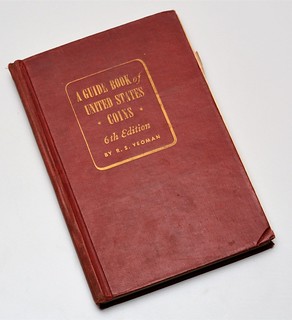 1952 USA. 6th Edition ERROR Red Book with inverted binding. Yeoman, R. S. A Guidebook of United States Coins. Whitman Publishing Company, 6th edition, 1952. 12mo, Hardbound with red cover and gold stamp on front cover and spine. 254 pages; black and white illustrations. Standard hardcover edition of the Red Book, but the interior is inverted (upside-down) when compared to the cover. This is a rare binding error for this book and additionally so with this early edition. Shows wear on cover, with a split from the front cover to the binding (unrepaired), damage to page 147/148 (portions cut out), and ink marks on some pages.
1952 USA. 6th Edition ERROR Red Book with inverted binding. Yeoman, R. S. A Guidebook of United States Coins. Whitman Publishing Company, 6th edition, 1952. 12mo, Hardbound with red cover and gold stamp on front cover and spine. 254 pages; black and white illustrations. Standard hardcover edition of the Red Book, but the interior is inverted (upside-down) when compared to the cover. This is a rare binding error for this book and additionally so with this early edition. Shows wear on cover, with a split from the front cover to the binding (unrepaired), damage to page 147/148 (portions cut out), and ink marks on some pages.
From the American Numismatic Association eBay store. Not in great shape, but a cool item for the numismatic bibliophile. -Editor
To read the complete lot description, see:
1952 USA. 6th Edition ERROR Red Book with inverted binding.
(https://www.ebay.com/itm/314232267842)
WAYNE'S NUMISMATIC DIARY: NOVEMBER 20, 2022
On the afternoon of Tuesday November 15, 2022 it got "end of days" dark outside, and the rain began. It rained throughout my evening commute. But rather than going home, my GPS routed me toward J. Gilbert's steakhouse in McLean, where the monthly dinner of my Northern Virginia numismatic social group Nummis Nova would be held.
The rain was relentless, and the traffic and darkness didn't help, but I did reach my destination safely and found a parking place near the door. I still needed an umbrella against the downpour. I was early, and our table wasn't ready yet. I found some of our members waiting in the bar. Wayne Herndon, Jon Radel, Daryl Haynor and our host Roger Burdette were seated on barstools. I ordered a glass of wine and chatted with Jon and Wayne before greeting my guests Jonas Denenberg and Kellen Hoard. Both had been guests in the past. Jonas is in 11th grade, a Fairfax Coin Club member and a budding coin dealer with a booming business; Kellen is a freshman at George Washington University and writes a column for The Numismatist. They'd made it here on public transportation.
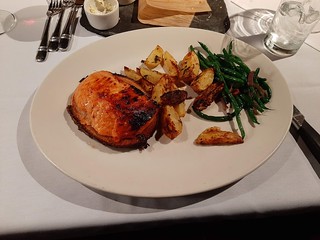 Soon we were seated in a narrow private room. Along the way we were joined by Julian Leidman. I grabbed a chair near the middle and soon Steve Bishop was seated beside me with Kellen and Jonas across from us. I remarked to my guests that I'd never had a bad meal here, and the night kept the streak alive. Here's my salmon dinner.
Soon we were seated in a narrow private room. Along the way we were joined by Julian Leidman. I grabbed a chair near the middle and soon Steve Bishop was seated beside me with Kellen and Jonas across from us. I remarked to my guests that I'd never had a bad meal here, and the night kept the streak alive. Here's my salmon dinner.
Clockwise from left: Kellen Hoard, Jonas Denenberg, Daryl Haynor, Wayne Herndon, Roger Burdette, Julian Leidman, Jon Radel, and Steve Bishop.
Jonas's Silver Ticket
The day was historic for Northern Virginia, but I'm not talking about the recent election. It was the long-awaited opening day of the Metro's Silver Line extension to Dulles Airport and beyond. My own neighborhood, Ashburn, is a distant suburb of Washington D.C. and it's the terminal stop on the new line. After three billion dollars and four years of delays, the Metro was finally open.
To celebrate the occasion, the transportation authority held a drawing for Willy-Wonka-style "Silver Tickets" for the inaugural run, and Jonas had managed to snag one. He rode the initial trip and brought home a bag of swag and other souvenirs. Here he is showing us his Silver Ticket and banner. Below, as a numismatic tie-in is the Metro's version of a commemorative transportation token - a special Silver Line Opening SmartTrip card. Congrats, Jonas!
Counterfeit Detectors
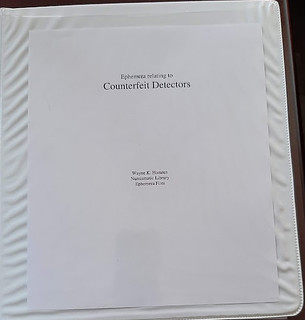 As I often do, I brought along one of the many binders housing my numismatic ephemera collection. Since I'd recently added the Eastman MONEY! title at the October Baltimore show (a purchase from Charlie Davis), I brought along my binder of counterfeit detectors. In response to Kellen's question, these are only counterfeit detectors in pamphlet form; my hardbound detectors from Laban Heath and other publishers remained at home. The pamphlets were a periodical, typically produced monthly and heavily used at businesses and banks. Today individual issues are quite rare, as most were discarded once they became outdated. This group is the result of some 40 years of collecting.
As I often do, I brought along one of the many binders housing my numismatic ephemera collection. Since I'd recently added the Eastman MONEY! title at the October Baltimore show (a purchase from Charlie Davis), I brought along my binder of counterfeit detectors. In response to Kellen's question, these are only counterfeit detectors in pamphlet form; my hardbound detectors from Laban Heath and other publishers remained at home. The pamphlets were a periodical, typically produced monthly and heavily used at businesses and banks. Today individual issues are quite rare, as most were discarded once they became outdated. This group is the result of some 40 years of collecting.
ANA Money Talks
I also brought some more modern numismatic ephemera - cassette tapes of the American Numismatic Association's Money Talks radio program. The audio segments were what today might be a podcast, providing listeners with a short daily narrated talk on different numismatic subjects.
I bought two of the tapes to the meeting - here's a group that I came across in storage recently. If the ANA agrees, the Newman Numismatic Portal will digitize these.
Crystal City, Texas Internment Camp Token I mentioned that I'd contributed one of the Money Talks scripts myself. It was on the WWII Japanese internment camp tokens, specifically those from the Crystal City, Texas camp. As it happens, one of the tokens is on offer in the Stack's Bowers December 2022 Tokens & Medals Collectors Choice Online Auction.
Undated (1942-1945) Crystal City, Texas (Family) Internment Camp Token. 1 Cent. Aluminum. Plain Edge. Mint State.
17 mm. Obv: Denomination 1 (cent sign) in with center with another expression of the denomination ONE / CENT above and below. Rev: Inscriptions DEPT. OF JUSTICE / I & N SERVICE around periphery and INTERNEE / CANTEEN in center.
To read the complete lot description, see:
Undated (1942-1945) Crystal City, Texas (Family) Internment Camp Token. 1 Cent. Aluminum. Plain Edge. Mint State.
(https://auctions.stacksbowers.com/lots/view/3-1062HX/undated-1942-1945-crystal-city-texas-family-internment-camp-token-1-cent-aluminum-plain-edge-mint-state)
Steve's Slabs
Steve Bishop displayed a couple of nice slabbed U.S. type coins.
Steve writes:
"Here are images of the coins I brought to Nummis Nova. The coins themselves are nothing particularly special, although they appear undergraded, and the Mercury has nice toning. What is interesting about these two are the holders. Increasingly, the holders are commanding a premium over the value of the coin. These are PCGS OGH (Old Green Holder) Version 2.1, used only between October and December of 1989.
"There is a website for PCGS Holders and the dates they were used. Another article of interest is "Buy the Holder, Not the Coin – 10 Certification Slabs to Look For."
Links:
PCGS Museum of Coin Holders
(https://www.pcgs.com/holdermuseum)
Buy the Holder, Not the Coin – 10 Certification Slabs to Look For
(https://coinweek.com/education/coin-grading/buy-the-holder-not-the-coin-10-slabs-to-look-for/)
Wrapping Up
Given the recent election day, politics and the election outcome colored much of the non-numismatic conversation, as did Elon Musk's Twitter makeover.
It was another fun evening, albeit with a smaller (and younger!) crowd than normal. The rain was still coming down as we straggled out of the building. Next month will be our annual holiday dinner with our spouses. Looking forward to it already!
BEN FRANKLIN'S FUGIO CENT
Dick Hanscomb passed along this article about the Fugio cent. Thanks. Here's an excerpt - see the complete article online. -Editor
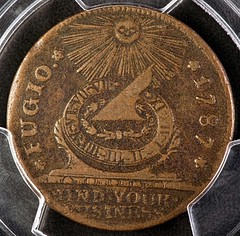 Perhaps the United States of America would not have become so politicized had we all followed a good piece of advice from Benjamin Franklin.
Perhaps the United States of America would not have become so politicized had we all followed a good piece of advice from Benjamin Franklin.
In Benjamin Franklin's 1737 book, Poor Richard's Almanac, he stated what would be his literal and figurative idea behind money, A penny saved is two pence clear.
Contrary to popular belief, Franklin, who was known for his invaluable maxims, never wrote the phrase, A penny saved is a penny earned.
The Fugio cent was created in response to small currency coin shortages during that period, as the Colonies were tired of relying on Great Britain's supply of coins, particularly small currency copper coins, the production of which was paused in 1775. It is estimated that two-thirds of all copper coins traded in Great Britain were counterfeit by the mid 1780s, and in 1787 Great Britain began using privately made Conder Tokens made of copper for smaller currency.
On the back of the Franklin cent, introduced in 1787, there are thirteen rings symbolizing the original thirteen colonies in a literal sense. These linked rings create an unbroken chain encircling, We are one,
along with United States.
Beyond its broader figurative significance, Franklin regarded the number thirteen as an important number in his own philosophy. Throughout the coin's design, Franklin imbues his ethical and moral positions along with literal and symbolic messaging. He provides an exact weight of 10 grams of copper, or 157.5 grains. Even the subtle addition of grooved edges is a homage to historical moral character and the relation to money as it equally deters clipping or counterfeiting.
And there's more. In 1752, Franklin openly supported the change to the Gregorian calendar being used throughout the Colonies. Prior to that, only various colonies observed the same calendar year. The Gregorian calendar fits thirteen weeks in by a multiple of four, equaling a total of fifty-two weeks. With each week being dedicated to one of his key virtues for personal development, four times per year.
The thirteen interlocking rings on the coin's design symbolize the colonies and Franklin's virtues. He believed every person should be responsible for their character building. Within his desire for personal development, he proposed thirteen virtues.
In his philosophy of personal progress, he believed people should dedicate a week to practicing each of these respective virtues . After thirteen weeks, when each virtue has been practiced, the cycle begins anew, and this happens four times a year. Franklin believed if each person focused on these virtues for an entire week, four times per year, they would surely progress.
This reflects Franklin's belief that virtue did not come naturally to humans, but was achieved over time through discipline. This was one reason Franklin saw time as precious, and he believed a country's liberty is made by each individual working on themself. As a Stoic, he understood life's delicate and finite number of years, all the way down to the importance of respecting others' time, as well as one's own. Contrary to popular myth, Franklin did not invent Daylight Savings, but he certainly believed in the importance of a strict schedule making the best use of daylight and personal progress throughout one's life.
This too is reflected in the Fugio Cent. On the front of the coin is a sun smiling and shining down onto a sundial, and within the sundial are hours of the day. The word Fugio imprinted on the left is a Latin word meaning I fly,
or I flee,
but it has more of a philosophical and historical recognition of ‘time flying by,' a theme reflected in three words on the Fugio Cent.
To read the complete article, see:
The Hidden Message on Ben Franklin's Fugio Cent
(https://fee.org/articles/the-hidden-message-on-ben-franklin-s-fugio-cent/)
SS CENTRAL AMERICA KNIGHT'S CROSS MEDAL
An unusual medal recovered from the wreck of the SS Central America is part of the upcoming December 3, 2022 Holabird SSCA artifact sale. A passenger receipt is included with the lot. -Editor
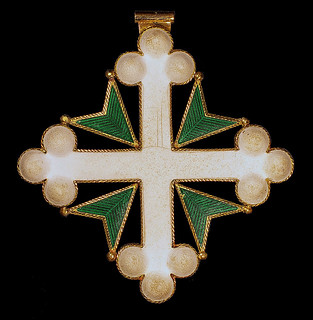 Among the interesting and enigmatic artifacts recovered from the S.S. Central America is a medal of the Knight's Order of Saint Maurice and Saint Lazarus found in the first cabin area. The history of the order transitioned over time from the separate Order of Saint Lazarus, the Patron Saint of Lepers, established pre-1100 in Palestine and the Order of Saint Maurice, the Patron Saint of Savoy, established in the 1400s.
Among the interesting and enigmatic artifacts recovered from the S.S. Central America is a medal of the Knight's Order of Saint Maurice and Saint Lazarus found in the first cabin area. The history of the order transitioned over time from the separate Order of Saint Lazarus, the Patron Saint of Lepers, established pre-1100 in Palestine and the Order of Saint Maurice, the Patron Saint of Savoy, established in the 1400s.
Both monastic brotherhoods evolved into hereditary military institutions of the nobility within the Catholic Church. The orders were combined in 1572 in the face of challenges from the Protestant Reformation and Muslim military activities in the Mediterranean region. Badges of the two orders were combined to form a white-enameled cross bottony of the Order of Saint Maurice, with a green-enameled Maltese Cross, the Cross of the Order of Saint Lazarus, placed in saltire between the arms of the cross bottony.
The badge of each class except that of Knight and Dame is topped by a gilt crown. The modern knight's badge is 41mm across, while that of a dame is slightly smaller at 37mm. The specimen in this auction is 64 x 60 mm and weighs approximately 30 grams. It is double-sided -- each side being practically identical -- and in excellent condition, with a slight staining of the raised bottony knobs on each side.
There is a more detailed article on this item in the printed catalog. There is also a video of the recovery of the item linked from the lot page. Amazing. Check it out. -Editor
The SS Central America Artifacts Auction catalog has 268 pages of detailed treasure stories about the people, jewelry, gold and goods onboard the famous "Ship of Gold" that sank off the North Carolina coast in 1857 with tons of gold on board. While the coins and nuggets have already been sold and are in thousands of collections around the world, the artifacts are only just now released, available for the first time, as part of a two part sale in December and February. Online auction platforms do not carry the wealth of information found in the catalog, inclusive of three-dimensional photographs of the items on the seafloor as they were discovered. Get your limited edition printed catalogs today and enjoy the fascinating world of the SS Central America treasure.
Catalog A features shipwreck artifacts retrieved exclusively from the S.S. Central America The Ship of Gold,
and is presented in a collectors edition spiral bound format inclusive of 3D Glasses and 3D underwater imagery of the spectacular treasure artifacts as they were discovered on the ocean floor.
Catalog B contains complimentary Gold Rush era artifacts including gold, gold pokes, Gold Rush related documents and more.
To read the complete lot description, see:
Knight's Cross of the Order of Saints Maurice and Lazarus with Passenger Receipt [146650]
(https://holabirdamericana.liveauctiongroup.com/Knight-s-Cross-of-the-Order-of-Saints-Maurice-and-Lazarus-with-Passenger-Receipt-146650_i46905195)
To watch the recovery video, see:
SSCA Recovery of the Knights Cross, Lot 1145
(https://www.youtube.com/watch?v=XQFAd3fOL-I)
To read the earlier E-Sylum article, see:
S.S. CENTRAL AMERICA ARTIFACT CATALOGS
(https://www.coinbooks.org/v25/esylum_v25n45a02.html)
THE RAREST VICTORIA CROSS
While a number of Victoria Cross medals have been awarded to Canadians over the decades, many are lamenting the fact that none have been awarded the purely Canadian version of the medal created in 1993. -Editor
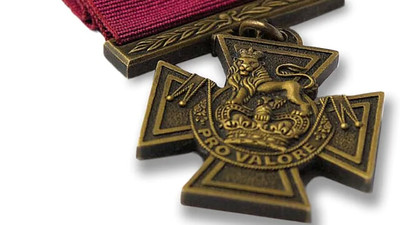 The military says that while it handed out more bravery medals per capita than Canada's allies did during the Afghan mission, no single act by a Canadian soldier unquestionably met the "extremely rare standard" needed for the highest honour.
The military says that while it handed out more bravery medals per capita than Canada's allies did during the Afghan mission, no single act by a Canadian soldier unquestionably met the "extremely rare standard" needed for the highest honour.
Canada is alone among its major allies in not having honoured any military member with its most prestigious medal. Many with ties to the military community — including former Conservative leader Erin O'Toole — wonder if the VC has been put out of reach for soldiers, sailors and aircrew today.
It's a personal matter for some former soldiers.
"It was always kind of stuck in the back of our minds. It just didn't feel right that nobody got the VC, [that] everyone else gave one out," said retired corporal Bruce Moncur, who was gravely wounded when an American ground attack jet accidently strafed Canadian troops in Afghanistan at the start of the milestone 2006 battle known as Operation Medusa.
More than 40,000 Canadian military members took part in the Afghan campaign — Canada's longest-ever overseas military campaign. For many of them, the fact that no Canadian who fought in Afghanistan has ever received the VC leaves them feeling as though their war, their devotion and sacrifice, somehow didn't quite measure up.
"We do feel forgotten. We do feel that our sacrifices are being brushed under the rug, and we do feel as if, you know, there's so many elements of us that just get overlooked," said Moncur. He pointed out that while Canadians mark notable First and Second World War events — even heroic, bloody defeats like Dieppe in 1942 — "we don't commemorate the anniversaries of what we just did" in this generation's war.
"As somebody that fought in Afghanistan, as somebody that bled and got shot, I am outraged by the fact that a lot of the guys did not get their proper respect and dues for what they did over there. It's literally — quite literally — the least they could do," said Moncur.
While Canada did not award its modern version of the Victoria Cross for actions in Afghanistan, it did present a host of lesser awards, including 18 Stars of Military Valour (the second-highest designation), 89 other bravery medals and more than 300 "mentions in dispatches" — an official written report to command headquarters describing an individual soldier's gallant conduct.
Moncur and a group of other veterans — including retired general Rick Hillier, the former chief of the defence staff — have waged a tireless campaign to get one or more of the military stars of valour awarded in Afghanistan upgraded to a Victoria Cross.
The British awarded three VCs in Afghanistan and one in the Iraq War. The most recent was presented in 2015 to Lance Cpl. Joshua Leakey, of 1st Battalion The Parachute Regiment, for an action in 2013.
The Australians, slightly more generous, handed out four VCs, mostly to their special forces. The Victoria Cross for New Zealand has been awarded only once — to Cpl. Willie Apiata, also a special forces soldier, for bravery under fire in Afghanistan in 2004.
Since 2001, the U.S. has awarded its VC equivalent — the Medal of Honor — to 20 of its soldiers for actions in Afghanistan. Five of them received the award posthumously.
The last time Canada awarded its top medal for military gallantry was during the Second World War. Lt. Robert Hampton Gray — who died attacking a Japanese warship in 1945, days before the war ended — was the last recipient. Up until his death in 2005, Pte. Ernest "Smokey" Smith was the last living Canadian VC recipient; he received the medal for action in Italy in 1944.
In total, 99 Victoria Crosses have been awarded to Canadians or Canadian-born citizens serving with Commonwealth forces. They were all awarded back when the British still administered the medal on behalf of Commonwealth nations.
The Canadian version of the VC was created in 1993. The actual medal was not struck until 2008.
So what does a Canadian soldier have to do today to win the Victoria Cross?
To read the complete article, see:
'The least they could do': Veterans push Canada to award its first Victoria Cross
(https://www.cbc.ca/news/politics/victoria-cross-canadian-forces-1.6645954)
JAPAN PREPARES FOR NEW BANKNOTES
Don Cleveland passed along this story about Japan's paper money. Thanks. -Editor
For nearly 40 years, people in Japan have been happy when they see Yukichi Fukuzawa's face. Not necessarily because of any personal affection for the esteemed educator, linguist, and entrepreneur, but because since 1984, Fukuzawa has appeared on the 10,000-yen bill, the highest-value piece of paper currency in Japan.
Fukuzawa's stint as the poster/bill boy for monetary gains is going to be coming to a close, though. As of this month the Japanese government has stopped printing new Fukuzawa bills. That fate is also shared by the other current Series E
banknotes, the 5,000-yen bill with author Ichiyo Higuchi and 1,000-yen bill with scientist Hideyo Noguchi.
The Series E bills (photo at top) went into circulation in 2004, which is also when Noguchi and Higuchi made their on-yen debuts.
The current group's departure makes way for their replacements on the upcoming Series F bills: economist Eiichi Shibusawa (10,000-yen bill), educator Umeko Tsuda (5,000 yen), and scientist Shibasaburo Kitazato (1,000 yen).
The Series E bills (photo at top) went into circulation in 2004, which is also when Noguchi and Higuchi made their on-yen debuts.
The current group's departure makes way for their replacements on the upcoming Series F bills: economist Eiichi Shibusawa (10,000-yen bill), educator Umeko Tsuda (5,000 yen), and scientist Shibasaburo Kitazato (1,000 yen).
The new bills will instead bear illustrations of Tokyo Station circa 1914, wisteria, and a reproduction of ukiyo-e woodblock artist Hokusai's Great Wave off Kanagawa.
To read the complete article, see:
Japan has stopped printing its current yen bills; Mt Fuji only element to be retained in new set
(https://japantoday.com/category/national/japan-has-stopped-printing-its-current-yen-bills-mt-fuji-only-element-to-be-retained-in-new-set)
COINS IN MEDICINE
An American Numismatic Society Pocket Change blog by Jesse Kraft discusses an unusual use of coins in medicine. -Editor
Figure 1. Kerokan (Indonesian for scraping
) is repeated downward, linear, and pressured strokes over lubricated skin using a hard object with a smooth edge, usually a coin. The process is repeated until ecchymoses appear—the discoloration of the skin resulting from bleeding underneath (different from a bruise). The more ecchymoses that appear (translated into heat escaping the body), the better it is believed to remedy a variety of symptoms that are related to the common cold. In English, coining is often used as a synonym to kerokan.
As numismatists, we know that coins have many, many functions and characteristics. Some of those are inherent from the time the coin is struck (such as a medium of exchange or as propaganda), while others may not arise until long after a particular coin is no longer in circulation (such as a tool for historians / archaeologists or as an alchemic timestamp for metallurgists). Other characteristics may not seem so straightforward, for instance, the use of coins in medicine. Coins have a very long history of medicinal usage. The Greek physician Hippocrates (the Father of Western Medicine
) used silver coins to heal wounds and control infection, Romans swallowed small copper coins to cleanse the body of toxins, and the practice of kerokan in Southeast Asian cultures (Fig. 1). To many modern practitioners, these numismatic treatments are seen as traditional and alternative forms of medicine, and even quackery.
Other medical treatments that involve coins, however, are not as risky or invasive and are even considered useful today. One of these is known as coin-sound. Coin-Sound is a diagnostic test that is used to determine whether or not an individual suffers from a punctured lung. A punctured lung can cause air or fluid to leak into the pleural cavity—the potential space between the pleural sac that surrounds each lung—known as pneumothorax (air) and hydrothorax (fluid), respectively. To test for this, a coin is held flat against the side of the patient's chest that is thought to be punctured, and tapped with a second coin. With a stethoscope on the direct opposite side of the patient, if there is fluid or air in the pleural cavity, the practitioner will hear a sound resonate, as opposed to quickly mute. At least one source necessitated the use of silver coins, in particular, in order to achieve the best results. Writing in 1898, Dr. C. F. Hoover described the sound as a shrill, high-pitched metallic consonance, which, once heard, will always be recognized.
Hoover practiced on human cadavers and live cows to ensure he had it right.
The sound itself is not produced by the pressure of the air or fluid that has entered the pleural cavity, nor is it the sound from the coins themselves. Rather, the sound comes from tension that is created on the bounding walls of the pressurized cavity. Under normal circumstances (with a negative pleural tension), the walls of the cavity are actually loose and under less tension than when the lung is collapsed. Once collapsed and air/fluid rushes in, the parietal pleura that is attached to the inner chest is stretched and tense, its elasticity heavily tested. Under these circumstances, the shockwave caused by the strike of the two coins held on the chest allows for the parietal pleura to vibrate and emit the sound on its own accord.
Armand Trousseau (1801–1867; Fig. 3) first observed and described coin-sound ca. 1857, which he called bruit d'arain, meaning brazen noise.
Trousseau was an important nineteenth-century French internist whose contributions to medicine last into the present day. Some of his better-known contributions include the Trousseau sign of malignancy (aka Trousseau's syndrome), and the Trousseau sign of latent tetany. He was instrumental in the creation of new modes of treatment for croup, emphysema, goiter, malaria, and pleurisy. In 1837, he won the prestigious prize of the French Academy of Medicine for his essay on laryngology, and later performed the first tracheotomy in France. He coined the terms aphasia and forme fruste. Trousseau is often erroneously credited with the quip use new drugs quickly, while they still work.
Eventually, Trousseau's bruit d'arain was found useful for other ailments as well. For instance, using the same technique, cases of advanced tuberculosis can be diagnosed. However, instead of placed over a punctured lung, the coins must be placed over a pulmonary cavity that connects with a bronchial tube. Instead of a strong resonance, this peculiar sound (which is only heard while the patient's mouth is open) is said to resemble that of a cracked pot being struck with another piece of metal. Hence the name, cracked-pot resonance.
While some of the medicinal uses of coins seem on the verge of wizardry, others have clearly proven to be practical. Throughout the late nineteenth and early twentieth centuries, coin-sound allowed for the ailments of many patients to become better understood and more efficiently diagnosed by doctors, thus easing the symptoms of their patients quicker than in earlier generations. Though replaced by more modern medicine, coin-sound was routine treatment for our forefathers. While the use of coinage in medicine was not part of their intended purpose, it is yet another function and characteristic that numismatists can apply to the study of money and expands our understanding of the many roles that coinage has played in our lives.
To read the complete article, see:
Coin-Sound, or the Bruit d'Arain of Armand Trousseau
(https://numismatics.org/pocketchange/trousseau/)
LOOSE CHANGE: NOVEMBER 20, 2022
Here are some additional items in the media this week that may be of interest. -Editor
An article on CoinWeek by Mike Byers discusses exotic and intentional U.S. error coins. -Editor
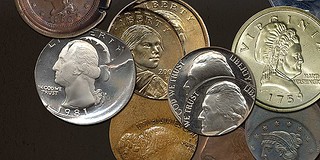 One of the most controversial categories of U.S. coins is Mint Errors. Many dealers and collectors, as well as coin auction houses, buy, sell, and trade many rare, exotic, and unique major mint errors. Obviously, some of these defy logic and were intentionally created and taken out of the Mint.
One of the most controversial categories of U.S. coins is Mint Errors. Many dealers and collectors, as well as coin auction houses, buy, sell, and trade many rare, exotic, and unique major mint errors. Obviously, some of these defy logic and were intentionally created and taken out of the Mint.
In the early 2000s, a group of several hundred U.S. error coins was found in a safe-deposit box. Dealer Fred Weinberg purchased this group, which included coins struck for Proof Sets and also coins struck for circulation. This group was auctioned by the California State Controller's Office of Unclaimed Property. The United States Secret Service inspected and released this collection to the State of California determining that it was legal to own. The State of California then auctioned the collection and the rest is history.
Another example of U.S. error coins escaping the United States Mint occurred in the 1970s. A hoard of Proof error coins were smuggled out of the San Francisco Mint inside the oil pans of forklifts that were being serviced outside of the Mint. This topic was discussed in the June 6, 2022 issue of Coin World, which covered Fred Weinberg's account of this story.
To read the complete article, see:
Exotic and Intentional U.S. Error Coins in the Marketplace
(https://coinweek.com/coins/error-coins/exotic-and-intentional-u-s-error-coins-in-the-marketplace/)
On his NGC blog, Jeff Garrett discusses the art of submitting rare coins for grading. -Editor
Numismatic publications are full of headlines about seemingly low-value coins bringing amazing sums in ultra-condition. I have personally observed lines of people at rare coin conventions submitting handfuls of coins that are not worth the cost of the submission. How are collectors to understand that their Franklin Half Dollar is not worth $100,000 if they have the coin certified?
For many, submitting rare coins for grading can be daunting, especially for the uninitiated. Understanding the process can save time, money and frustration, and fortunately, there are dozens of options to choose from when submitting coins. This guide will help you understand the different options available to you and, hopefully, help you better understand the submission process.
Some collectors submit coins for certification for the peace of mind of having an entire series authenticated and graded, and for the attractive display that comes with encapsulation. But for many others, submitting coins for certification is basically a mathematical equation. You need to determine if the coin will be more valuable if submitted for grading and authentication, and if the grading fees justify the cost. For example, it may not be profitable to grade common-date Morgan Silver Dollars in grades below MS 63. For the average collector, the added cost of the grading outweighs what the coins could be sold for uncertified on the current market.
To read the complete article, see:
Jeff Garrett: The Art of Submitting Rare Coins for Grading
(https://www.ngccoin.com/news/article/10914/)
Coin Update published what appears to be a U.S. Mint press release on the 2022 Coin of the Year Award for Most Historically Significant Coin. -Editor
United States Mint Director Ventris C. Gibson on November 10th accepted the 2022 Coin of the Year Award for Most Historically Significant Coin for the 2020 Women's Suffrage Centennial silver dollar from Peter H. Miller, president of Active Interest Media Home Group (pictured), which publishes Numismatic News, World Coin News, and Coins magazine.
The obverse (heads) of the Women's Suffrage Centennial silver dollar features overlapping profiles of three distinct women. Each woman is wearing a different type of hat to symbolize the many decades the suffrage movement spanned. The figure in the foreground is wearing a cloche hat with an art deco pattern and a button with the year of the 19th Amendment's ratification. The inscriptions LIBERTY, $1, and E PLURIBUS UNUM encircle the design.
The coin's reverse (tails) features the inscription 2020 being dropped into a ballot box styled with art deco elements to indicate the artistic style of the era. VOTES FOR WOMEN is inscribed inside a circle on the front of the box. The inscriptions UNITED STATES OF AMERICA and IN GOD WE TRUST are featured on the ballot box. Artistic Infusion Program artist Christina Hess designed both the obverse (heads) and reverse (tails) of the coin, which were then both sculpted by United States Mint Medallic Artist Phebe Hemphill.
To read the complete article, see:
U.S. Mint Director Ventris C. Gibson accepts Coin of the Year award for Most Historically Significant Coin for 2020 Women's Suffrage Centennial silver dollar
(https://news.coinupdate.com/u-s-mint-director-ventris-c-gibson-accepts-coin-of-the-year-award-for-most-historically-significant-coin-for-2020-womens-suffrage-centennial-silver-dollar/)
NEW LIBRARY: BOOKS YES, BUT MORE
Libraries have always been about more than books. They are at the core of their mission, but like The E-Sylum it's also about bringing people together, expanding knowledge, and making the world a better place for everyone. As a Pittsburgh native, I think of the young Scottish immigrant who found welcome at a free library provided by a wealthy neighborhood resident; when he later came into wealth himself, Andrew Carnegie "paid it forward" by endowing large libraries all across the country.
Here's an article about a new library housing 5 million books, but with most of its floorspace devoted to community space. -Editor
Popping up on the edge of the largest park in Shanghai, the city's newest library looks a bit like a towering cruise ship sailing through the canopy of trees below. Covering more than 1.2 million square feet across seven stories and two additional pavilions below, the Shanghai East Library is a giant vessel in its own right. It carries not only books and the kinds of study spaces libraries have always had, but a variety of community, social, and cultural spaces that show how the library as an institution is evolving.
Designed by Schmidt Hammer Lassen Architects, the library is one of the largest in the world, and expects 10,000 visitors a day. Chris Hardie, the firm's design director, says both the city and the design team wanted to ensure the project wasn't just a warehouse for the 4.8 million books in the library's collection, which is essentially what the city's current central library is.
For Shanghai Library East, the designers flipped that balance, making more than 80% of the square footage into non-book spaces—reading tables and study rooms, performance venues and lecture halls, cafes and gardens. Hardie says the design is intended to celebrate the library as a space of knowledge sharing and community. It was much more about what a library is becoming and how important it is in society,
he says.
To read the complete article, see:
It's got 1.2 million square feet, but most of this giant library has no books at all
(https://www.fastcompany.com/90809035/its-got-1-2-million-square-feet-but-most-of-this-giant-library-has-no-books-at-all)

